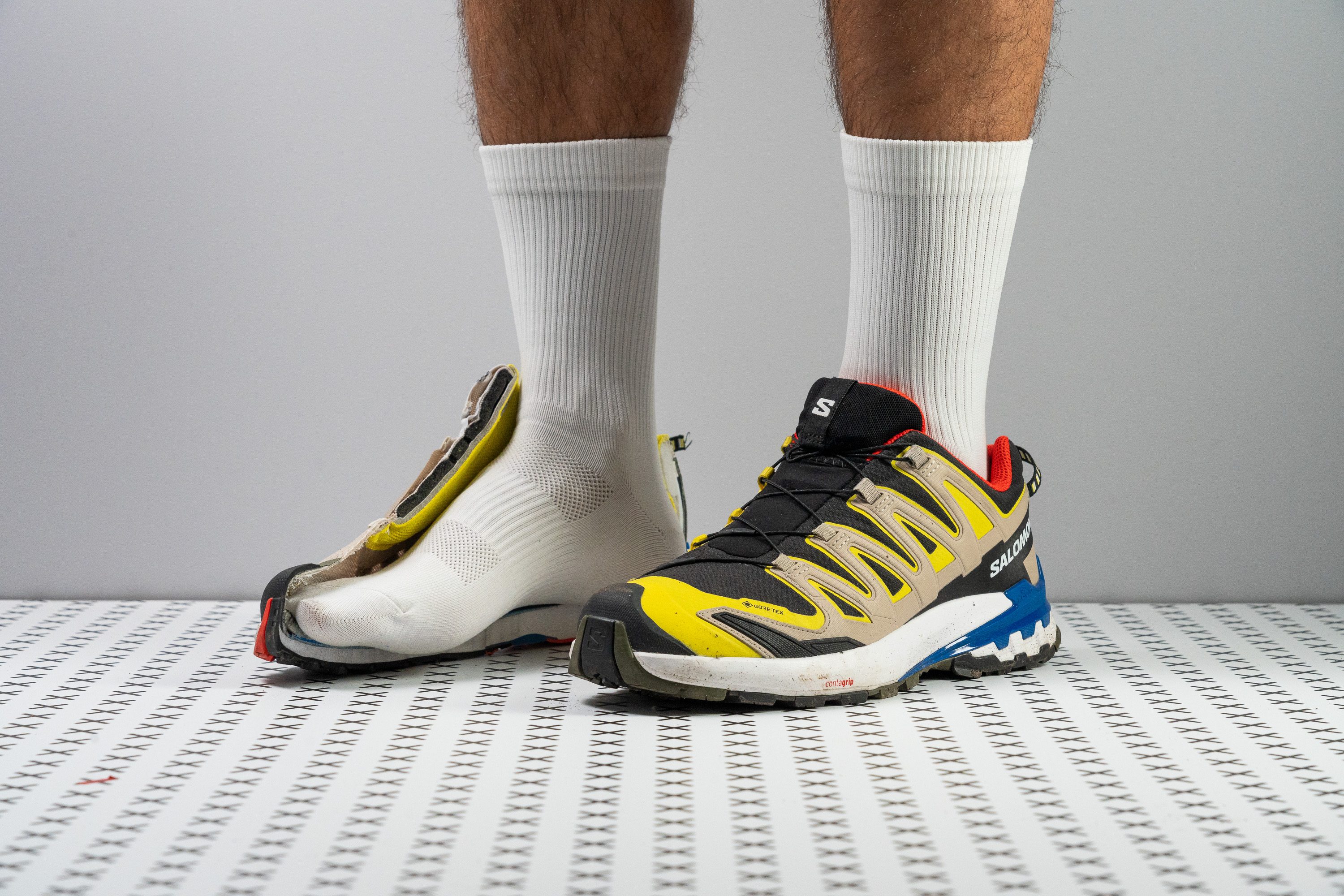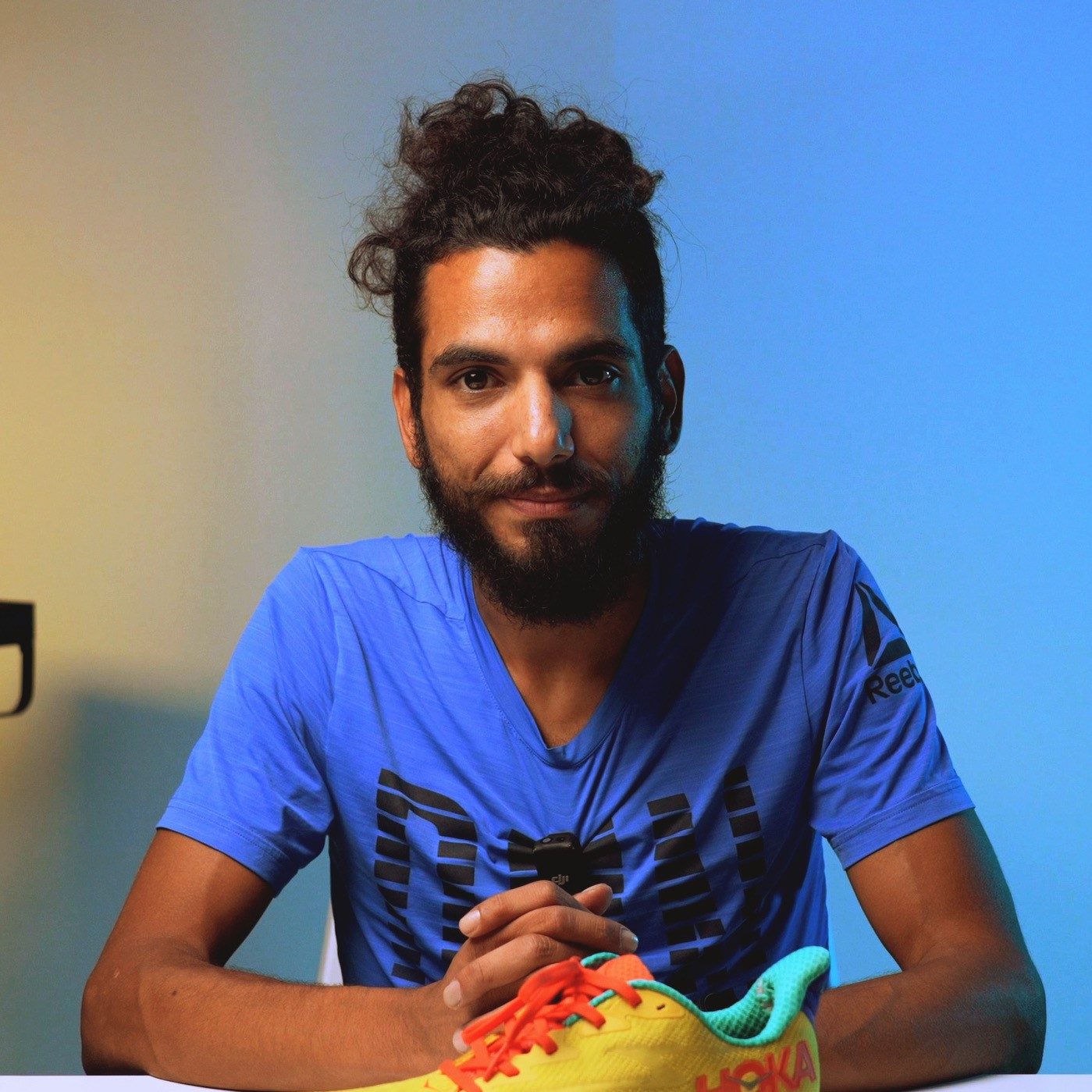Our verdict
- Top pick in best winter running shoes
- Top pick in best waterproof running shoes
Pros
- Incredibly protective
- Extremely stable and supportive
- Watertight Gore-Tex upper
- Flexible and forgiving on the foot
- Makes a great hiking companion
- Effectively dampens landings
- Generously padded from heel to tongue
- No lace bite whatsoever
- Durable, high-quality construction
- Simple yet snazzy design
- Simple yet snazzy design
Cons
- Could be lighter
- Rather firm cushioning
- Upper needs breaking in
- Lacks the agility for technical trails
Audience verdict
- Top 12% most popular running shoes
Comparison
The most similar running shoes compared
+ + Add a shoe | |||||
|---|---|---|---|---|---|
| Audience score | 84 Good! | 75 Bad! | 75 Bad! | 74 Bad! | |
| Price | £145 | £105 | £145 | £140 | |
| Trail terrain | LightModerate | Light | Light | LightModerate | |
| Shock absorption | Low | - | Moderate | - | |
| Energy return | Low | - | Moderate | - | |
| Arch support | Stability | Neutral | Neutral | Stability | |
| Weight lab Weight brand | 12.7 oz / 359g 12.7 oz / 360g | 10.3 oz / 293g 11.4 oz / 323g | 9.9 oz / 281g 10.6 oz / 300g | 12.2 oz / 346g 11.4 oz / 323g | |
| Drop lab Drop brand | 13.5 mm 11.0 mm | 10.2 mm 9.0 mm | 8.3 mm 9.5 mm | 12.5 mm 11.0 mm | |
| Strike pattern | Heel | Heel | HeelMid/forefoot | Heel | |
| Size | True to size | True to size | Slightly small | True to size | |
| Midsole softness | Firm | Firm | Soft | Firm | |
| Difference in midsole softness in cold | Small | Small | Normal | Small | |
| Plate | Rock plate | ✗ | ✗ | ✗ | |
| Toebox durability | Very good | Very good | Decent | Very good | |
| Heel padding durability | Decent | Good | Bad | Decent | |
| Outsole durability | Good | Good | Good | Good | |
| Breathability | Warm | Warm | Warm | Moderate | |
| Width / fit | Medium | Wide | Medium | Wide | |
| Toebox width | Medium | Wide | Wide | Medium | |
| Stiffness | Stiff | Stiff | Moderate | Stiff | |
| Torsional rigidity | Stiff | Stiff | Stiff | Stiff | |
| Heel counter stiffness | Stiff | Moderate | Flexible | Stiff | |
| Lug depth | 2.8 mm | 2.7 mm | 3.6 mm | 2.8 mm | |
| Heel stack lab Heel stack brand | 33.5 mm | 34.5 mm 35.0 mm | 32.1 mm 37.0 mm | 31.7 mm 28.0 mm | |
| Forefoot lab Forefoot brand | 20.0 mm | 24.3 mm 26.0 mm | 23.8 mm 27.5 mm | 19.2 mm 17.0 mm | |
| Widths available | NormalWide | NormalWide | Normal | NormalWide | |
| Season | Winter | Winter | Winter | All seasons | |
| Removable insole | ✓ | ✓ | ✓ | ✓ | |
| Orthotic friendly | ✓ | ✓ | ✓ | ✓ | |
| Waterproofing | Waterproof | Waterproof | Waterproof | - | |
| Ranking | #254 Bottom 33% | #363 Bottom 5% | #362 Bottom 5% | #368 Bottom 3% | |
| Popularity | #45 Top 12% | #249 Bottom 34% | #122 Top 32% | #123 Top 33% |
Who should buy
We recommend the Salomon XA Pro 3D v9 GTX as a great choice for:
- Outdoor enthusiasts looking for a versatile shoe that can handle some light jogging or accompany them on their next hike or backpacking adventure
- Those looking to keep their feet dry with a pair of waterproof shoes as they run or hike the trails
- Overpronating runners looking for a stable supportive shoe to hit the trails with
- Trail runners who frequent mixed and rocky terrains and need a shoe with grippy lugs
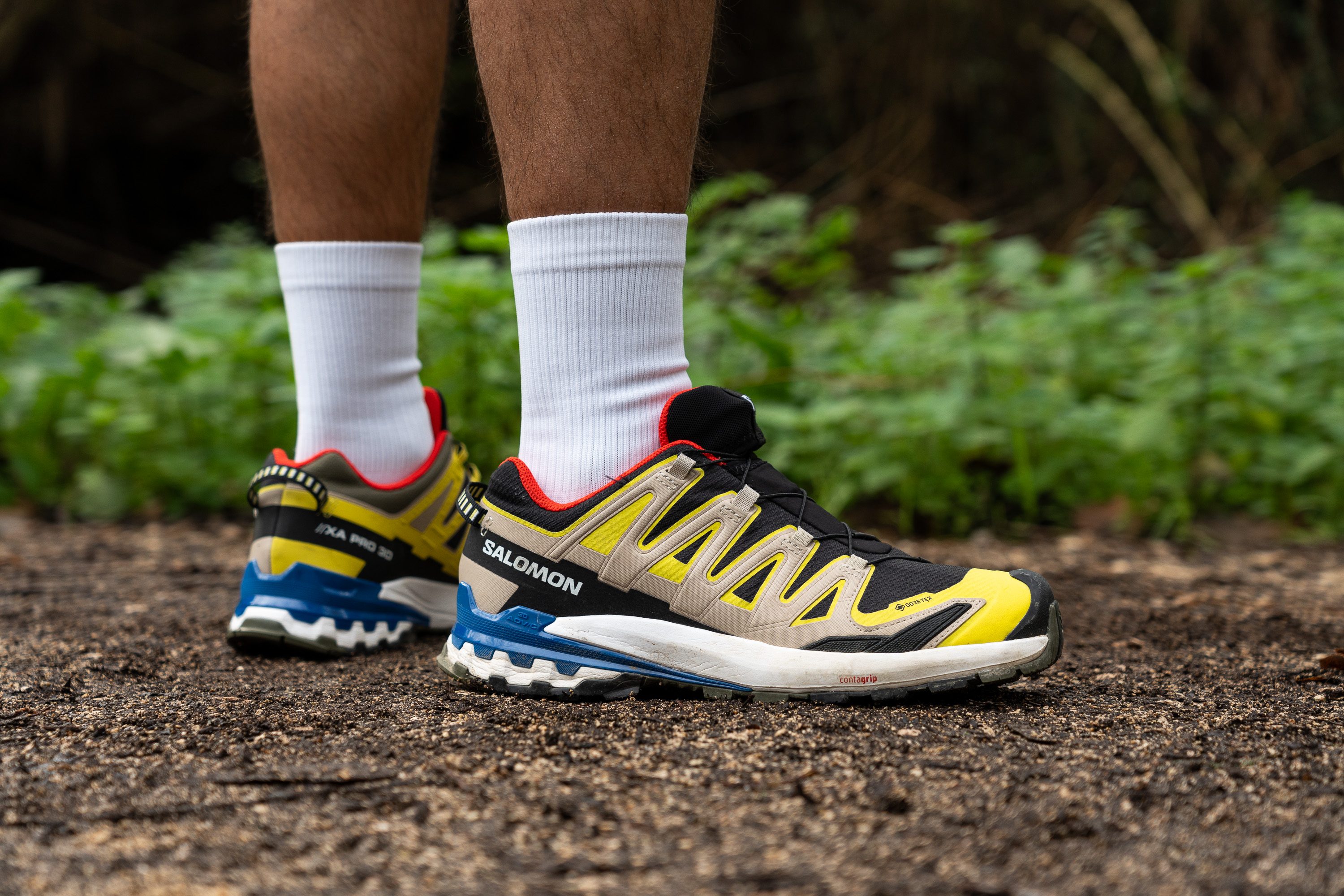
Who should NOT buy
The XA Pro 3D v9 GTX is quite heavy for a trail shoe, making it a little too burdensome for our speedier or longer runs. For those who prefer a lightweight shoe to tear along the trails in, we recommend the Nike Pegasus Trail 4 GTX instead.
With a heel drop of 13.5 mm, the XA Pro 3D v9 GTX might feel a little too steep to suit the stride of forefoot striking runners. The Saucony Peregrine 13 (3.9 mm) and the Brooks Catamount 2 (6.4 mm) are alternatives that offer less drastic offsets that are more conducive to forefoot landings.
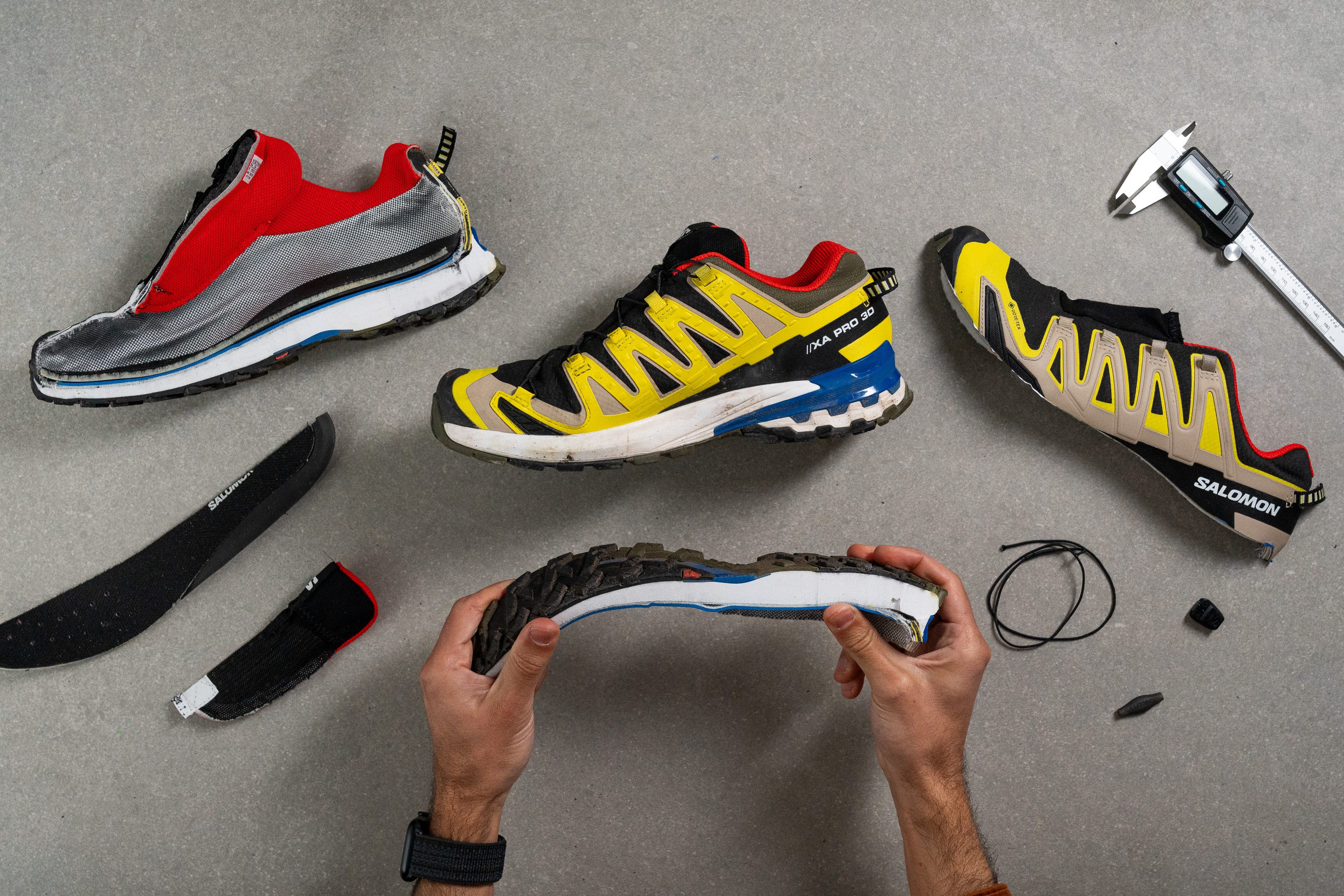
The XA Pro 3D v9 GTX's midsole is quite dense and firm which adds to the shoe's stable ride and makes it a good option for backpacking as well as running. However, for those who prefer a more plush and luxurious ride out of their trail shoes, we recommend looking into the Hoka Speedgoat 5 GTX or the ASICS Trabuco Max 2 as more pillowy alternatives.
Cushioning
Shock absorption
We didn’t find much protection for joints and muscles in the XA Pro 3D v9 GTX, as it only registered 93 SA in the heel and 67 SA in the forefoot. While that might appeal to those who enjoy an old-school ride, we believe it definitely limits the shoe’s versatility.
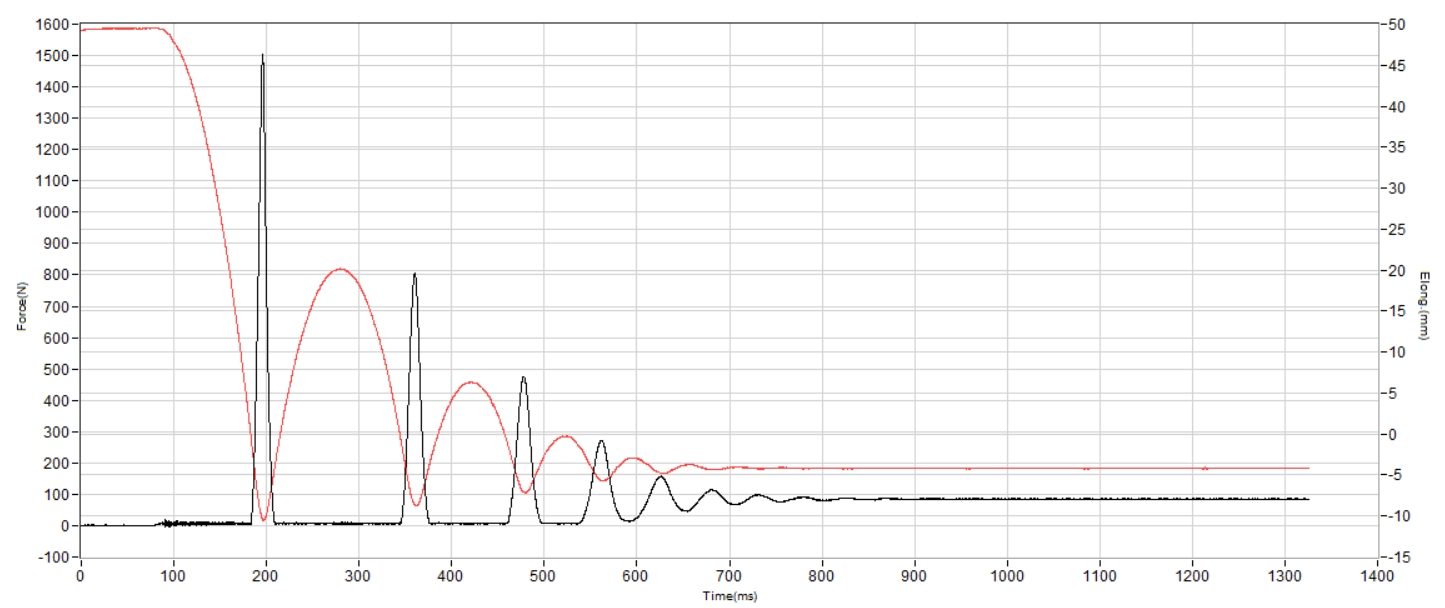
| XA Pro 3D v9 GTX | 93 SA |
| Average | 122 SA |
Energy return
Energy return is also far from impressive. We believe Salomon seriously needs to upgrade its foam tech: 47.4% feels really outdated and delivers a noticeably flat ride.
| XA Pro 3D v9 GTX | 47.4% |
| Average | 55.3% |
Heel stack
The XA Pro 3D v9 GTX's heel stack falls in line with our current lab average at 33.5 mm thick according to our calliper measurements.
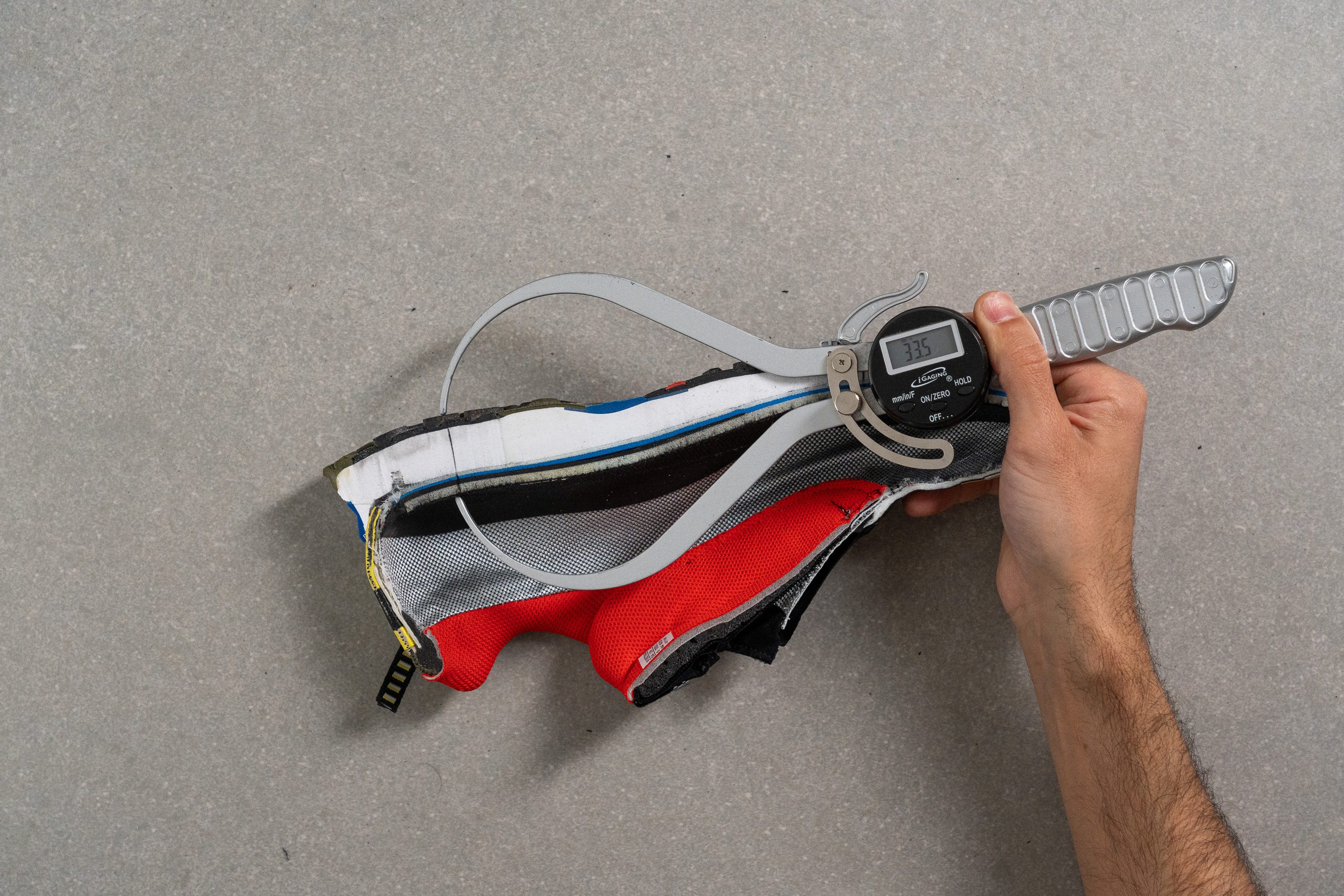
Having this much foam underfoot elevates our heel from any harsh obstacles underfoot and ensures that we're well protected from impact during landings.
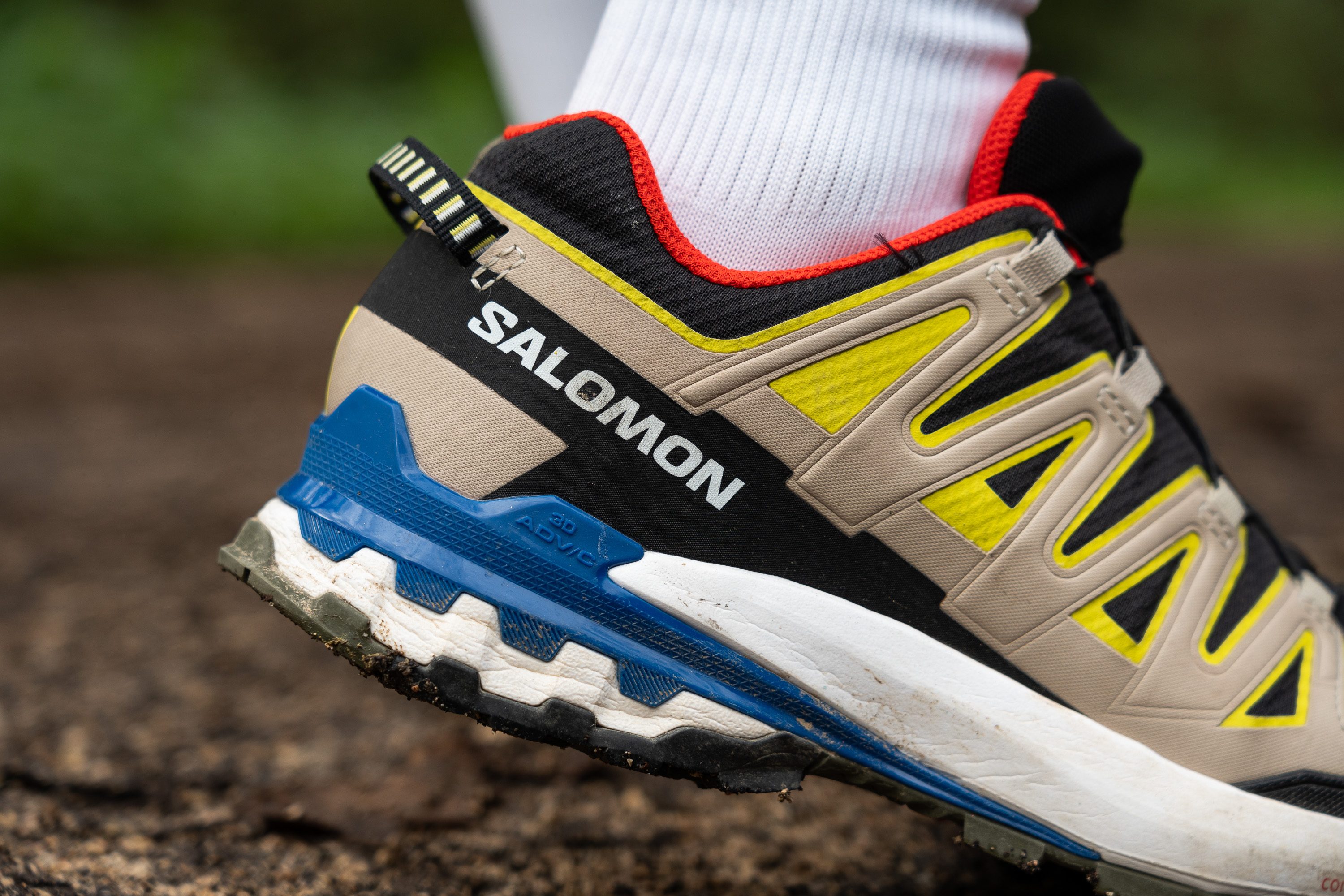
| XA Pro 3D v9 GTX | 33.5 mm |
| Average | 32.6 mm |
Forefoot stack
Moving up to the forefoot, the XA Pro 3D v9 GTX's stack is shorter than average at only 20 mm thick. Having such a low profile at the forefoot gives us a natural and intuitive sense of the ground which greatly factors into the stability of the shoe. We found this to be very beneficial not just while running, but when taking this shoe out for hikes or backpacking adventures.
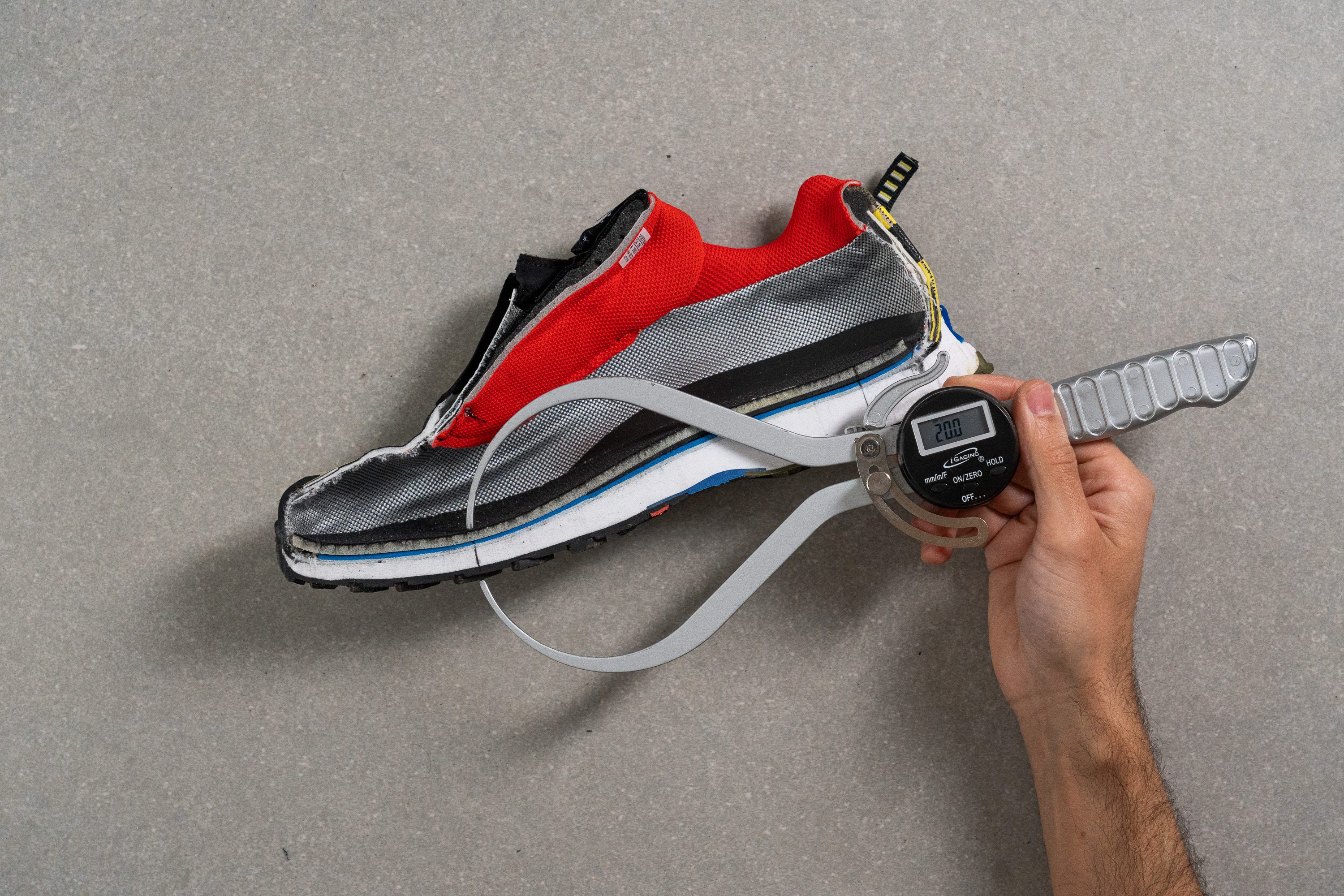
On the other hand, it does mean that forefoot striking runners have much less protective foam underfoot in this shoe. This shouldn't be an issue when it comes to easy runs over short to moderate distances but will feel lacking when pushing the mile markers beyond 15K. For a shoe that boasts a higher forefoot stack, we recommend checking out the Hoka Speedgoat 5 GTX.
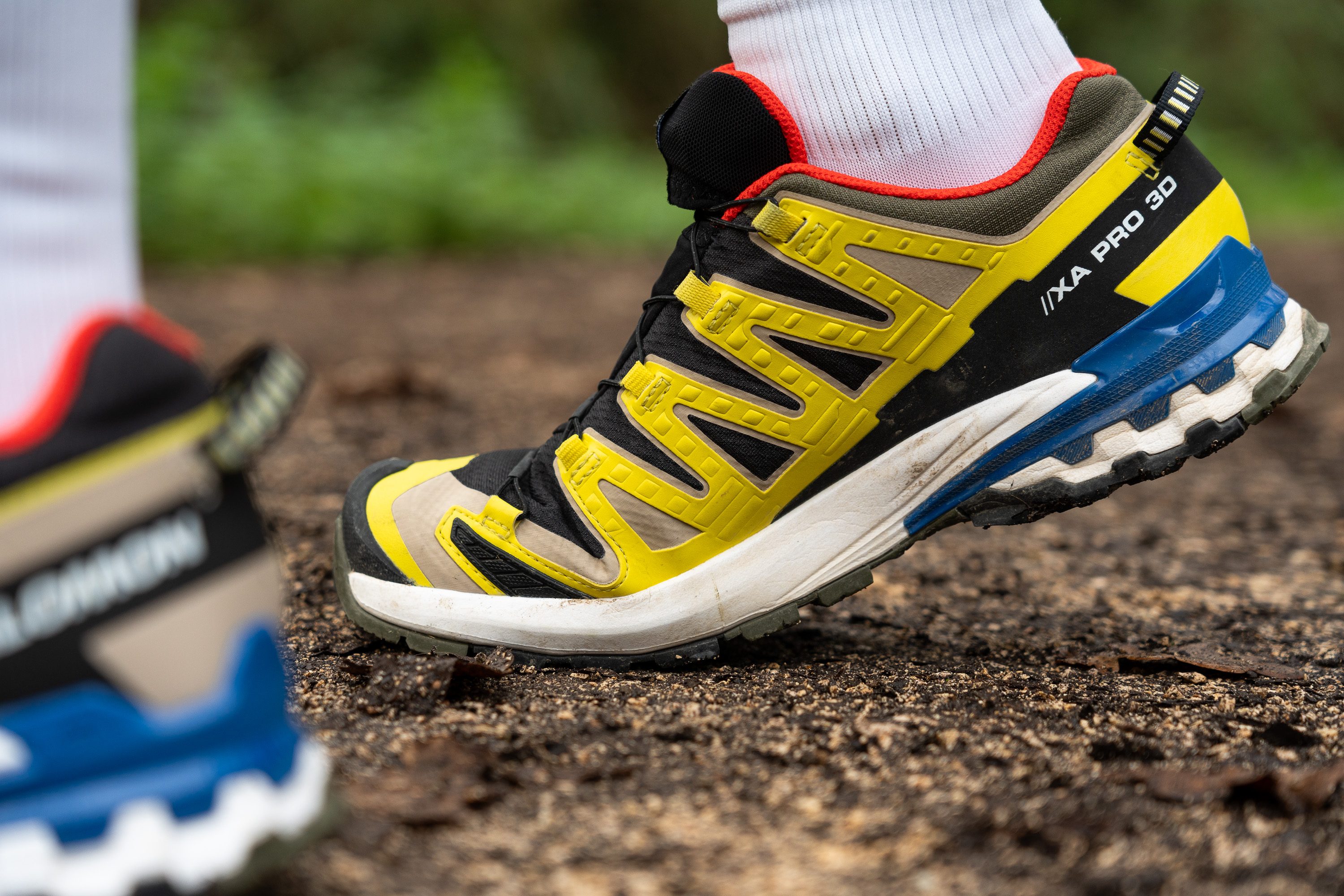
| XA Pro 3D v9 GTX | 20.0 mm |
| Average | 25.1 mm |
Drop
While advertised as having an 11 mm drop, the difference in our stack measurements leaves the XA Pro 3D v9 GTX with an actual offset of 13.5 mm. This still puts it in the category of high-drop shoes which is beneficial for heel strikers and those with lower leg or Achilles tendon issues as it promotes smooth heel-to-toe transitions and shifts the load to our hips and knees.
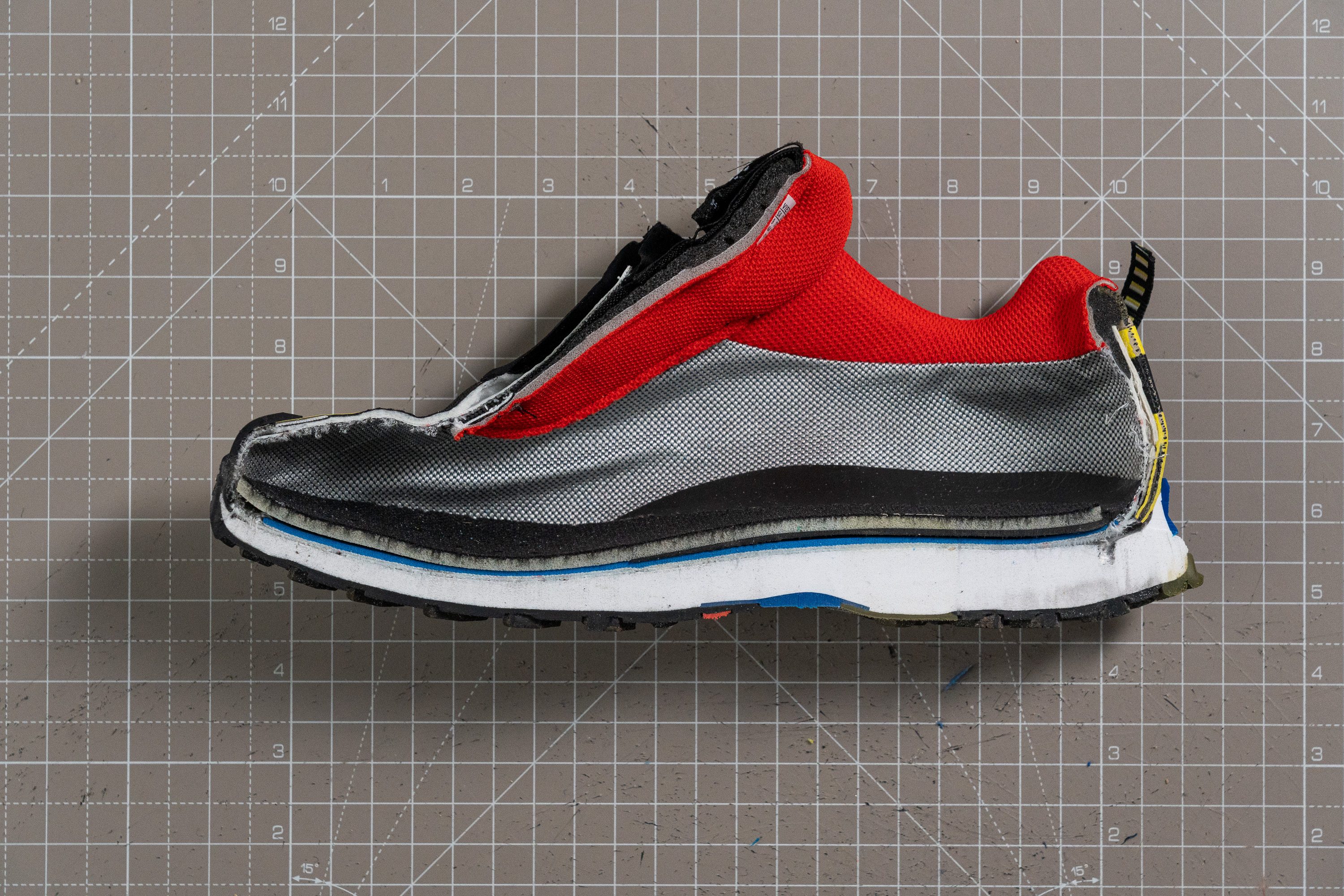
Forefoot strikers, however, may find this a little too steep to suit their running gait. For those runners, we recommend checking out the Saucony Peregrine 13 with its 3.9 mm drop instead.
| XA Pro 3D v9 GTX | 13.5 mm |
| Average | 7.6 mm |
Midsole softness
The XA Pro 3D v9 GTX feels rather brick-like underfoot, an opinion that we confirmed with our durometer which gave us a decidedly firm reading of 32.5 when we pressed it against the midsole.
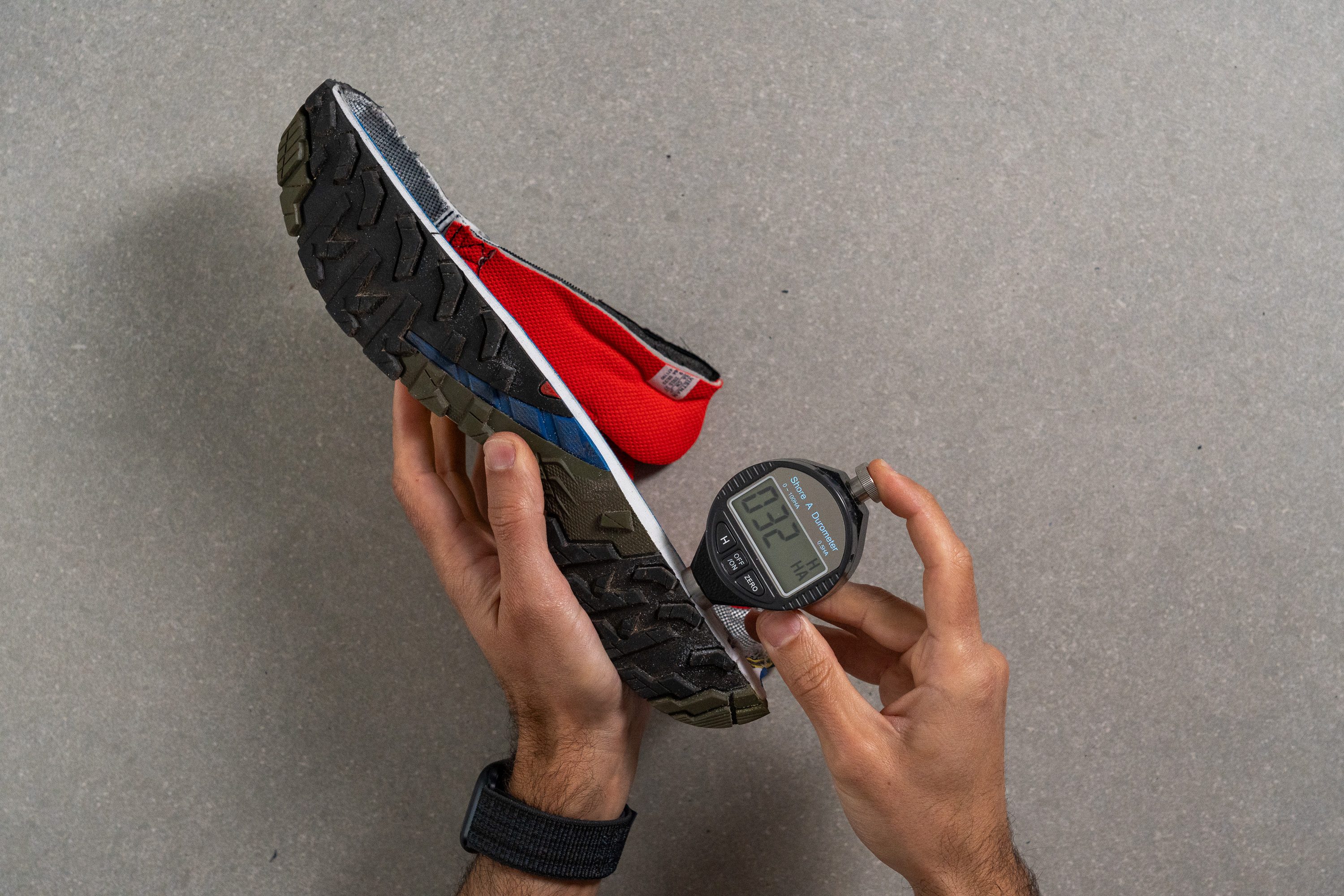
As such, the midsole doesn't compress very much under our weight but does effectively dampen the impact of our landings and has a relatively responsive rebound. However, the cushioning is far from pillowy or springy like what we find with the ASICS Trabuco Max 2.
| XA Pro 3D v9 GTX | 32.5 HA |
| Average | 22.0 HA |
Size and fit
Size
Salomon XA Pro 3D v9 GTX fits true to size (66 votes).
Internal length
| XA Pro 3D v9 GTX | 269.3 mm |
| Average | 269.0 mm |
Toebox width - widest part
Using our caliper, we measured the XA Pro 3D v9 GTX's toebox to be 101.2 mm wide at its widest point. This is wider than our current lab average which means that the shoe will provide a roomy fit for those with narrow to normal-width feet.
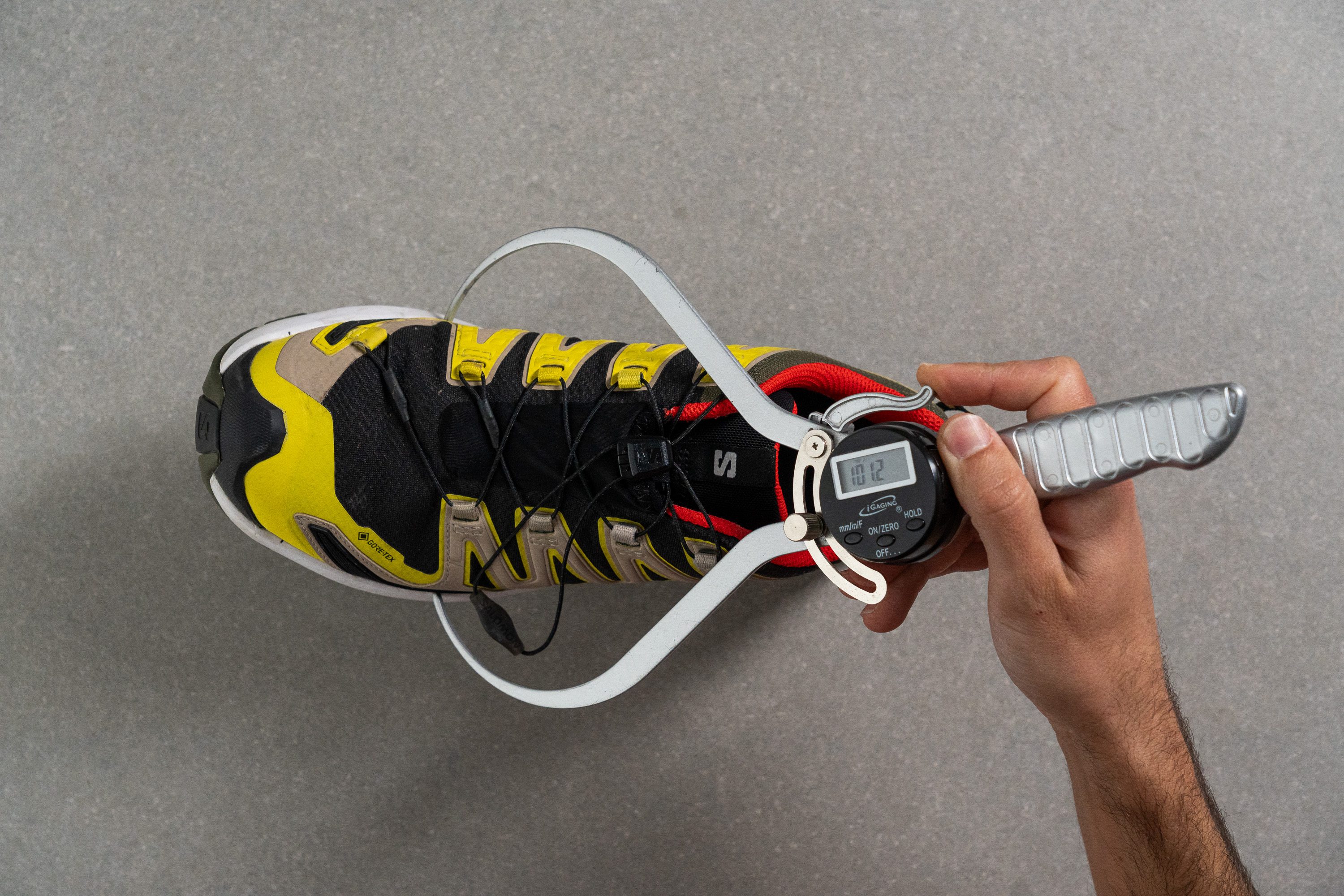
This test follows an older methodology, which is why you don't see recently tested shoes in the chart. Results from different methodologies can not be compared.
| XA Pro 3D v9 GTX | 101.2 mm |
| Average | 98.9 mm |
Toebox width - big toe
Up at the big toe, the XA Pro 3D v9 GTX's toebox tapers quite significantly to only 75.7 mm wide, making it narrower than our current lab average.
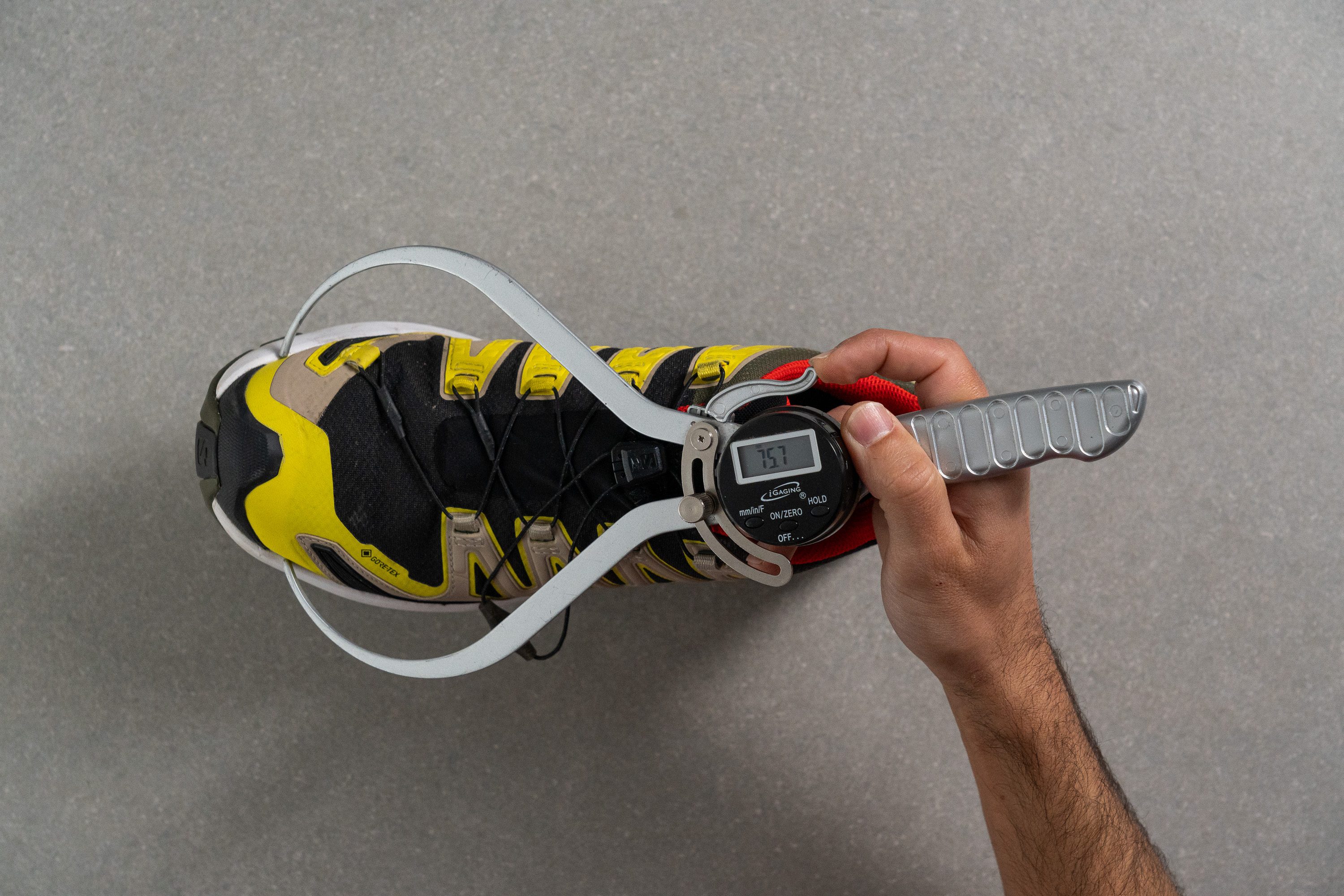
This doesn't give us much room for natural toe splay which can lead to developing hotspots and/or blisters over time, especially for those with broad feet.
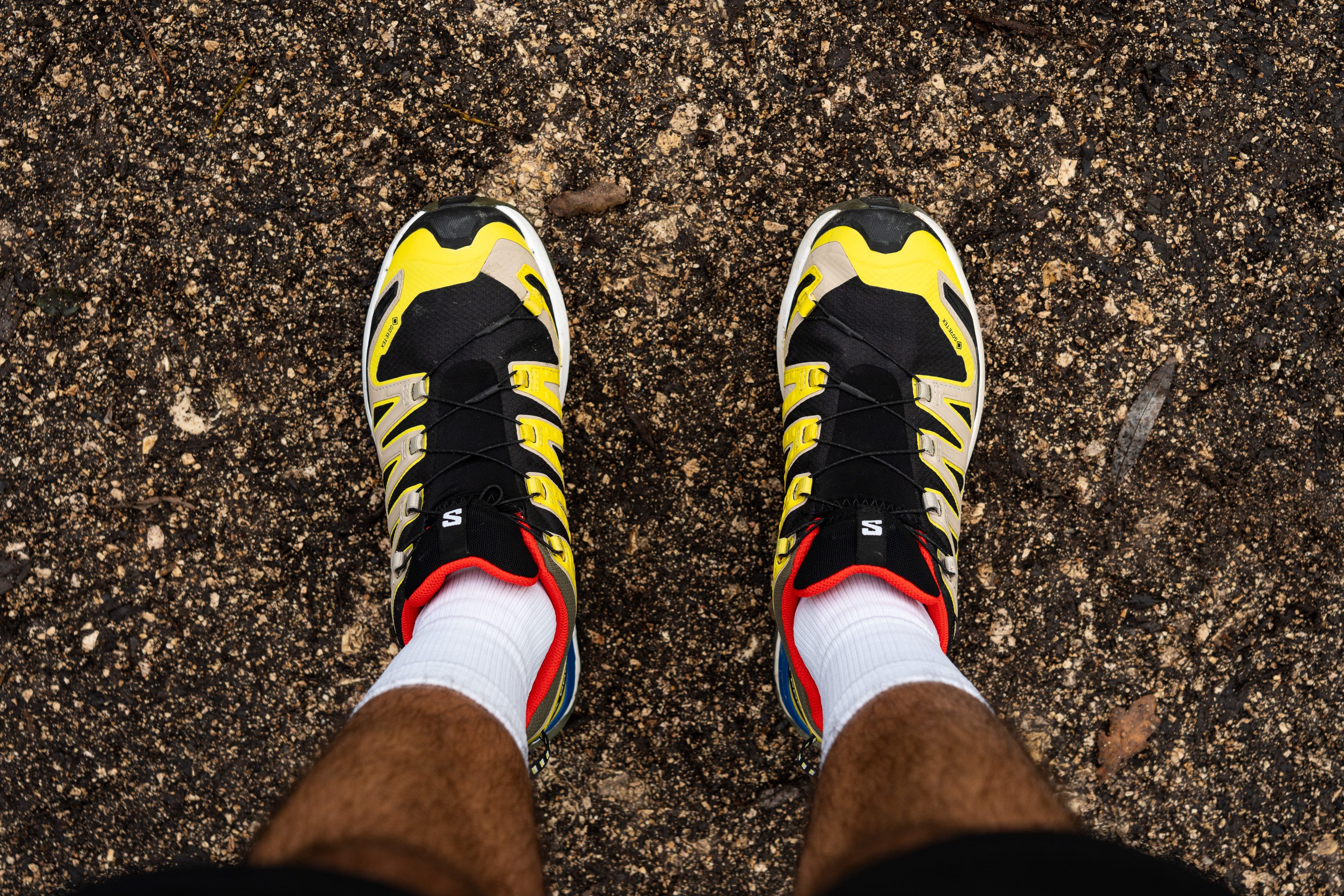
This test follows an older methodology, which is why you don't see recently tested shoes in the chart. Results from different methodologies can not be compared.
| XA Pro 3D v9 GTX | 75.7 mm |
| Average | 79.3 mm |
Traction / Grip
Forefoot traction
The Salomon XA Pro 3D v9 GTX scored 0.25 in our wet-grip test, a rather low result for a shoe designed for all-weather protection and rainy-day reliability. We believe Salomon needs to improve the outsole compound here.
| XA Pro 3D v9 GTX | |
| Average | 0.61 |
Lug depth
At 2.8 mm thick according to our calliper measurements, the XA Pro 3D v9 GTX's lugs are a little shy of our current lab average.
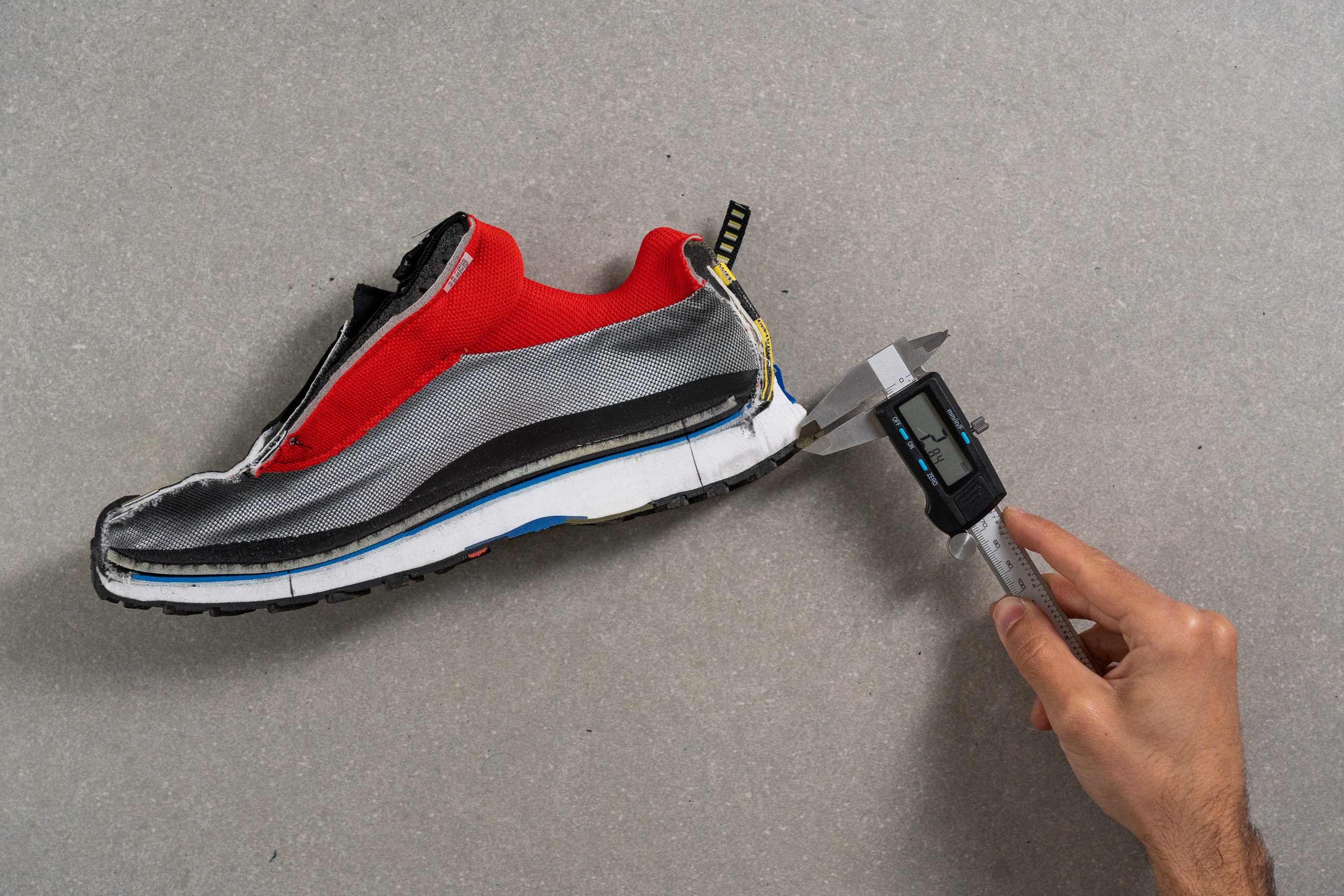
However, their pattern along the outsole combined with their grippy nature means that we enjoyed good grip and traction over various terrains while testing this shoe. Only muddy and very slick surfaces seemed to be able to get the better of the shoe.
| XA Pro 3D v9 GTX | 2.8 mm |
| Average | 3.5 mm |
Outsole design
The Salomon XA Pro 3D v9 GTX comes with a full-length rubber outsole and a clearly segmented pattern. Still, we believe this is an area where Salomon could improve—the current layout feels suboptimal for delivering reliable grip, particularly for forefoot strikers.
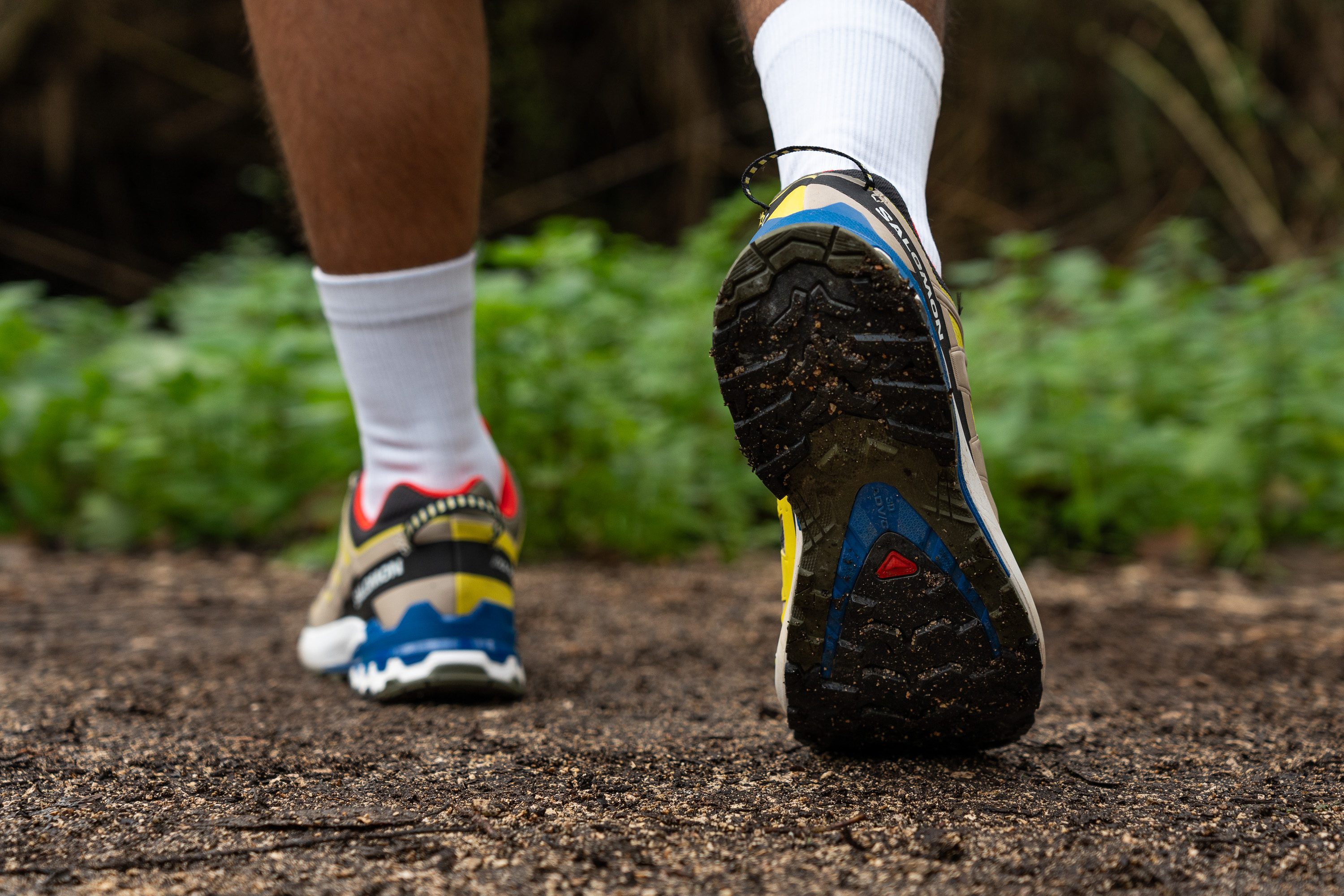
Flexibility / Stiffness
With 20.6N of force needed to bend the shoe 30 degrees after securing it to our machine, the XA Pro 3D v9 GTX is stiffer than the average trail shoe.
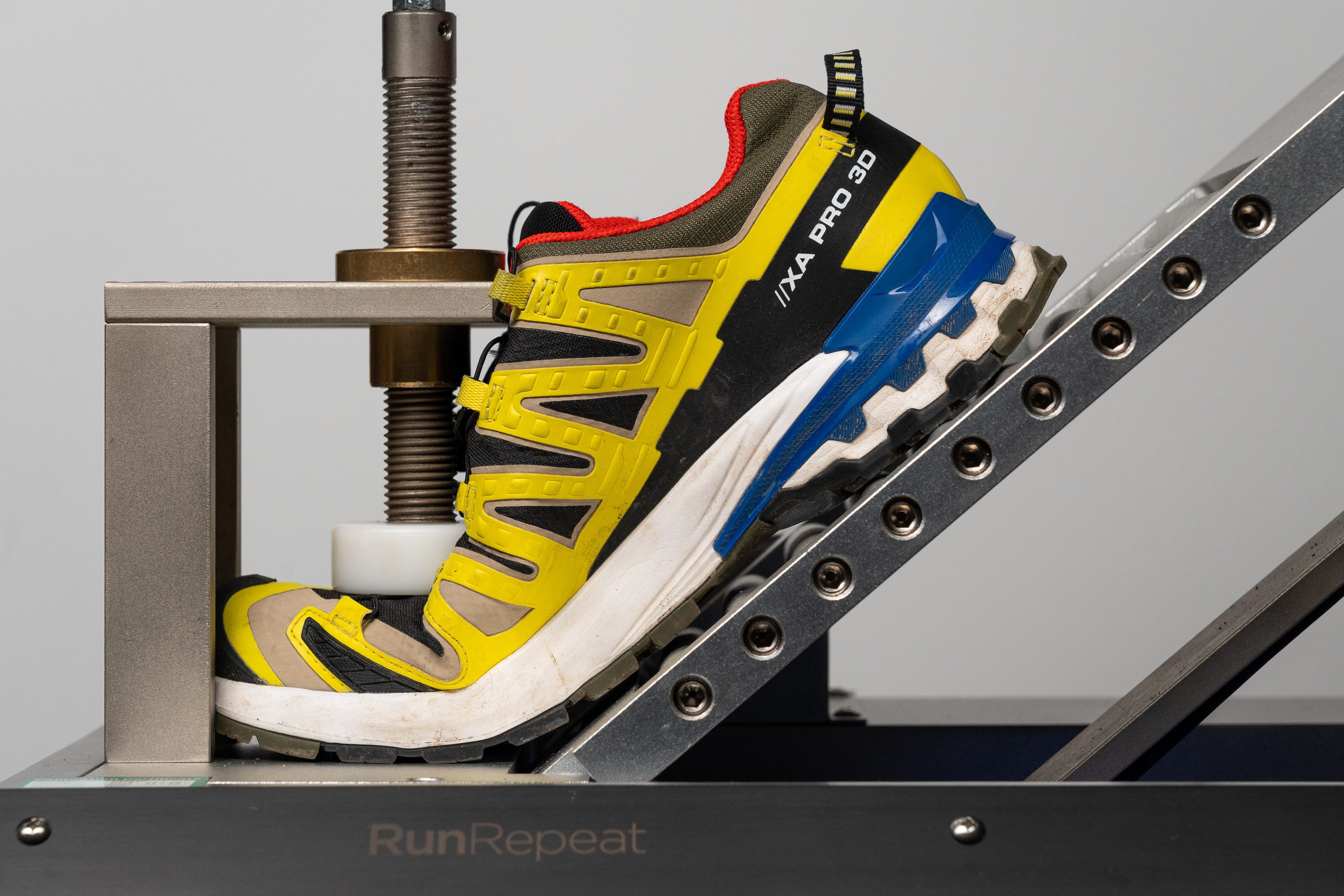
| XA Pro 3D v9 GTX | 20.6N |
| Average | 14.6N |
Stiffness in cold (%)
While its midsole performs quite favorably in the cold, the flexibility of the XA Pro 3D v9 GTX isn't nearly as consistent. Becoming 48.5% more stiff, the shoe will fee notably less forgiving on the foot during frigid winter runs.
| XA Pro 3D v9 GTX | 49% |
| Average | 32% |
Weight
Weighing in at 12.7 oz (359g), the XA Pro 3D v9 GTX is certainly a heavyweight among trail shoes.
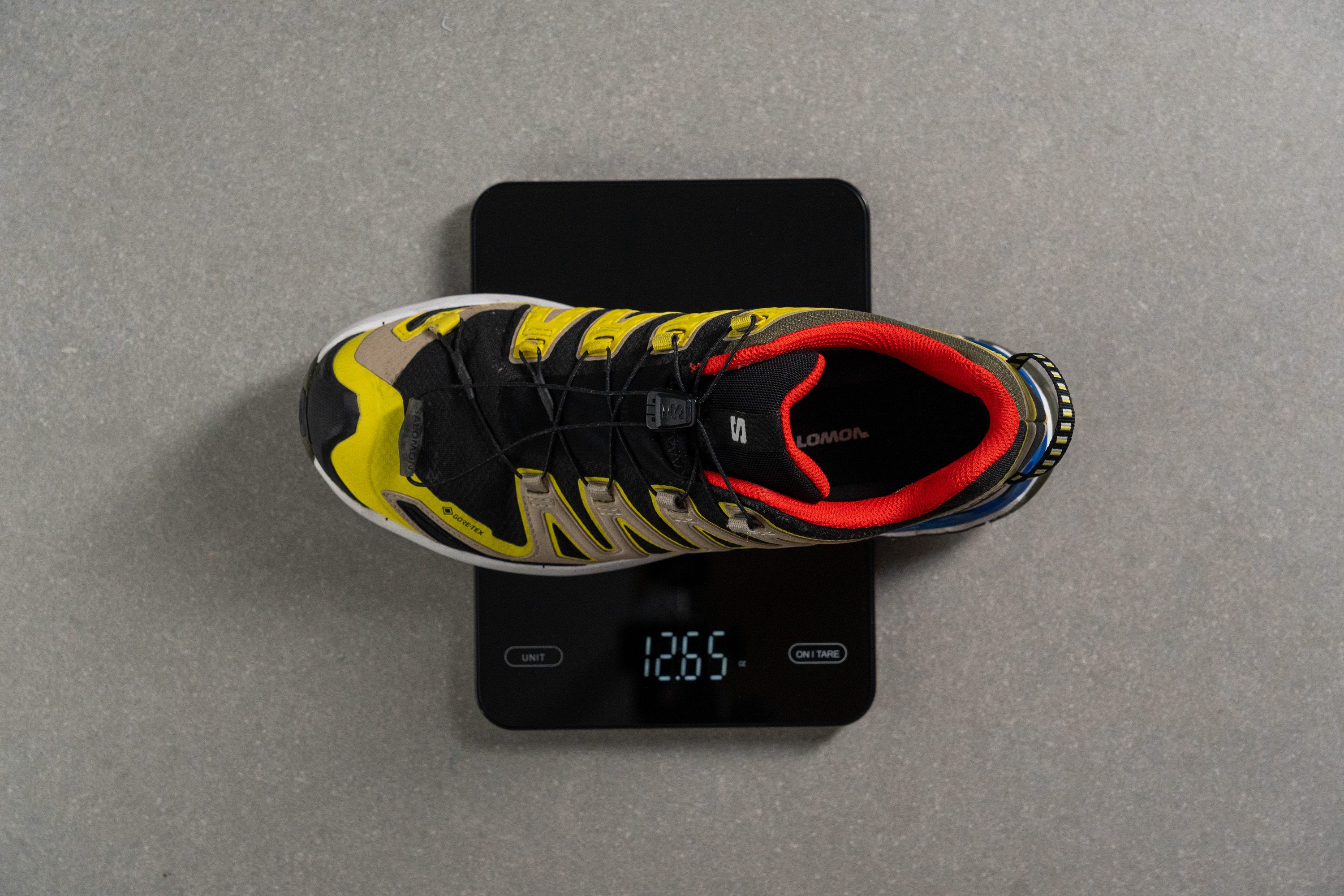
This added heft wasn't an issue during our easy runs or even while hiking in the shoe, though it did feel much more burdensome towards the end of our longer runs as achy legs and fatigue set in. It also makes the shoe a less-than-ideal choice for speedy runs. The Nike Pegasus Trail 4 GTX is a much lighter waterproof option that we found to be much more conducive to faster or longer efforts.
| XA Pro 3D v9 GTX | 12.7 oz (359g) |
| Average | 10.2 oz (289g) |
Breathability
As expected, the XA Pro 3D v9 GTX doesn't let a wisp of smoke filter through its watertight upper. This leads us to give it a predictable 1 out of 5 for breathability. While this confirms the impermeability of the shoe's upper, it also means that the shoe traps heat and feels rather toasty when we tested it on a warm day.
To further illuminate the insular nature of the upper, we backlit a cross-section of the shoe and found that it completely eclipses the light source. This clearly shoes that neither air nor water have any avenues to make their way into the shoe.
Our microscope shot of the unreinforced Gore-Tex at the toebox shows that it's made of an incredibly dense network of waterproof fibres braided in a compact and uniform pattern.
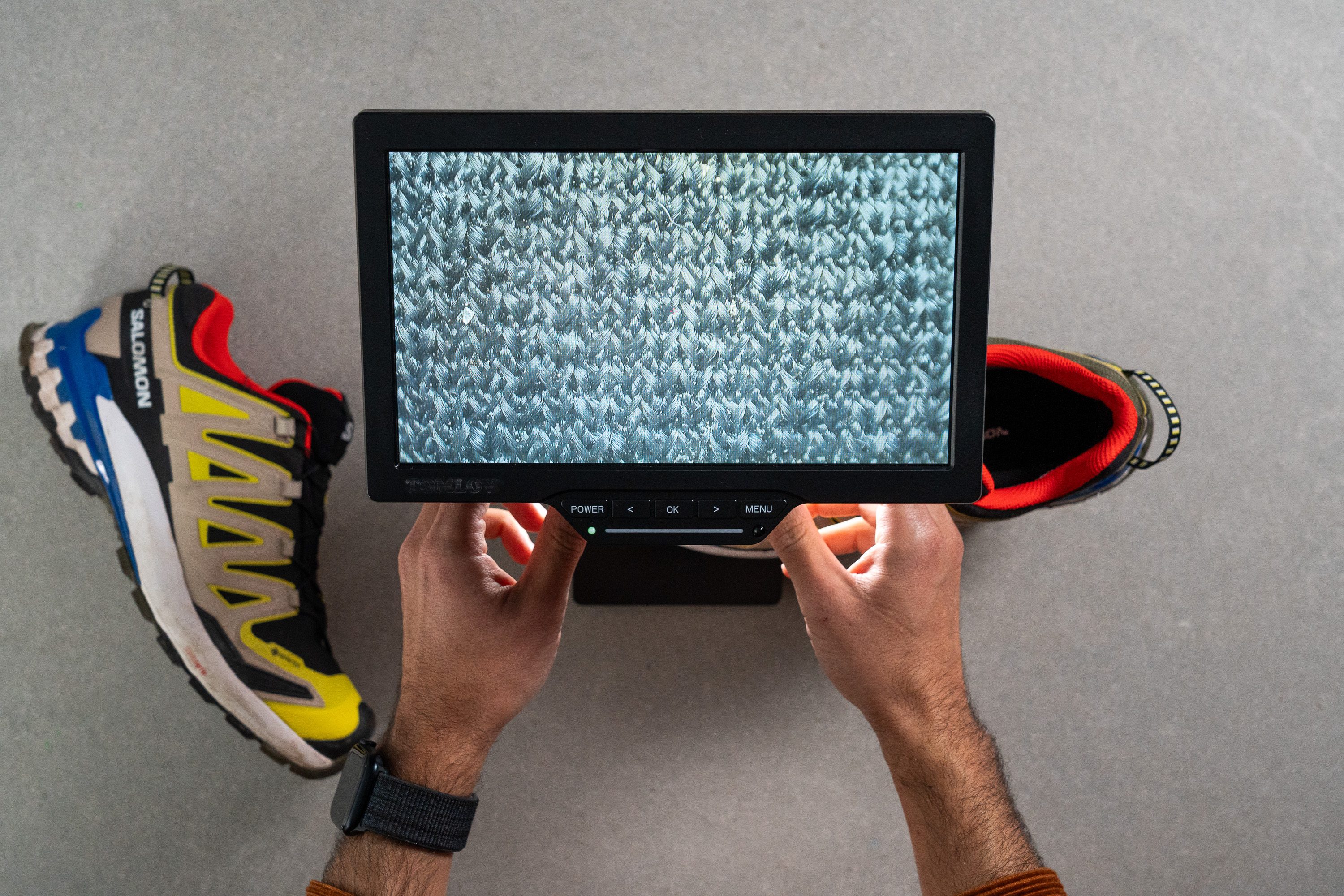
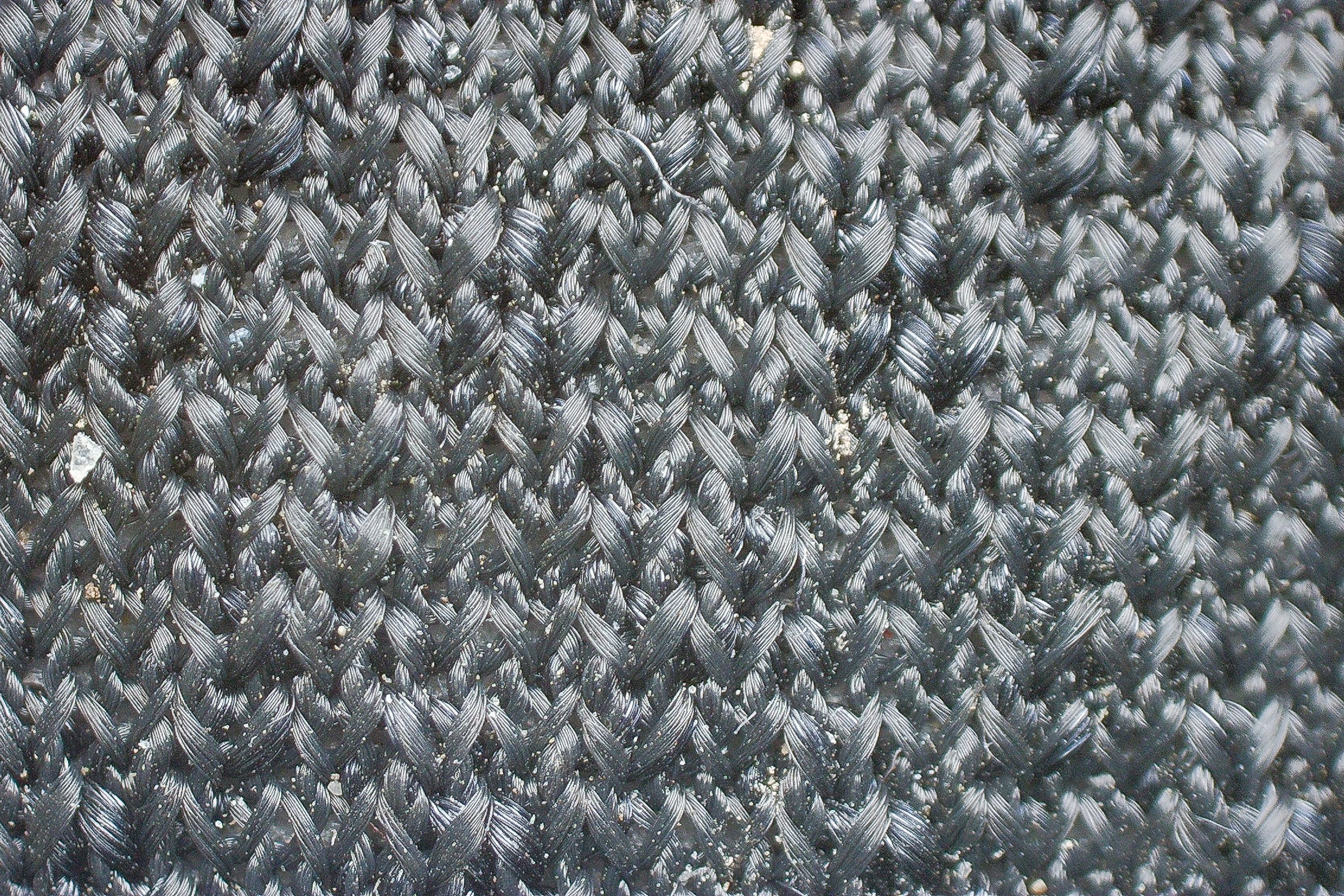
However, it's important to note that if water does get into the shoe through the top, the Gore-Tex membrane will keep it from draining out. As such, we don't recommend gambling on the depth of a murky puddle or splashing through riverbeds in this shoe. If getting the goot submerged in water is a possibility, we recommend looking into the Salomon Outpulse Mid GTX; a lightweight hiking boot with a trail shoe-esque ride that keeps our feet dry no matter what.
| XA Pro 3D v9 GTX | 1 |
| Average | 3.3 |
Stability
Lateral stability test
We were amazed at how well-planted and stable the XA Pro 3D v9 GTX felt during our test runs. This is thanks in part to the firm midsole that our feet don't sink into and the low forefoot that keeps us feeling nice and grounded as we go. However, the shoe has a few more stability tricks up its sleeve that we'll explore in the next sections.
Torsional rigidity
The XA Pro 3D v9 GTX makes use of the brand's 3D chassis technology in the form of a rigid, U-shaped piece of TPU embedded between the midsole and the outsole. This serves to give the shoe a high level of torsional rigidity that we scored a 5 out of 5 on our subjective scale as we were barely able to get the shoe to budge as bent and twisted in our manual assessment.
As such, the shoe resists any lateral rolling or twisting of our foot throughout our stride and, in that way, maintains a level base that facilitates stable landings even when we traverse uneven terrains. This also makes the shoe a supportive choice for those with overpronating strides as it helps promote a more neutral stride.
| XA Pro 3D v9 GTX | 5 |
| Average | 3.6 |
Heel counter stiffness
The heel counter is also quite rigid, earning a score of 4 out of 5 on our subjective scale. This provides us with a secure rearfoot lockdown that feels secure as well as comfy as it allows for some natural lateral movements of our heel without squeezing the life out of our tendons.
| XA Pro 3D v9 GTX | 4 |
| Average | 3 |
Midsole width - forefoot
Using our calliper, we measured the XA Pro 3D v9 GTX's midsole to be 111.1 mm wide at the forefoot putting it right on par with our current lab average.
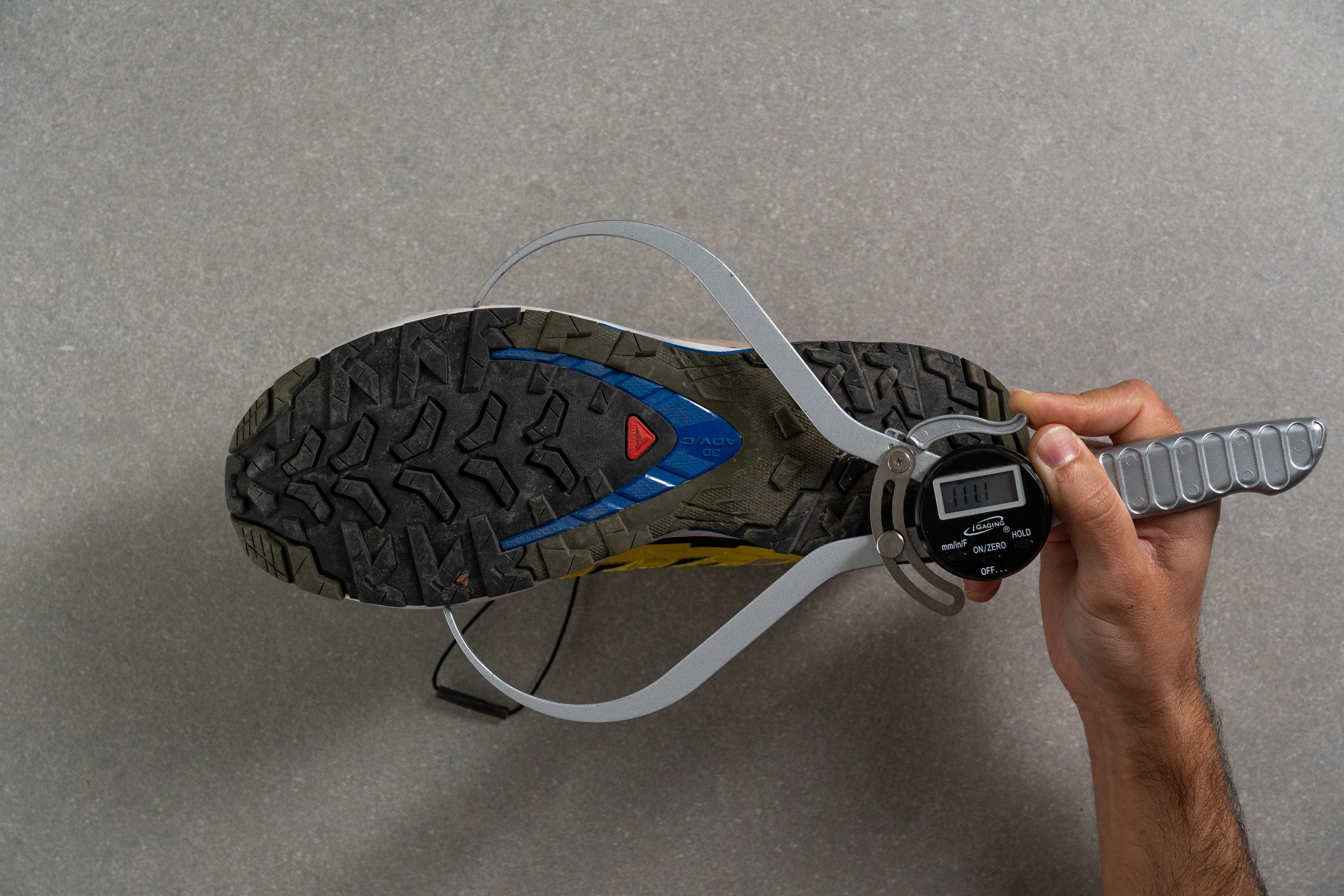
This gives us enough of a base underfoot to ensure stable landings during our test runs without the shoe feeling too blocky as we snake our way around corners and obstacles.
| XA Pro 3D v9 GTX | 111.1 mm |
| Average | 112.8 mm |
Midsole width - heel
Back at the heel, the midsole is considerably narrower than average at only 82.2 mm wide according to our calliper measurements. However, with the midsole being so firm, we don't expect this to feel too precarious for heel-striking runners as the shoe isn't wobbly by any means.
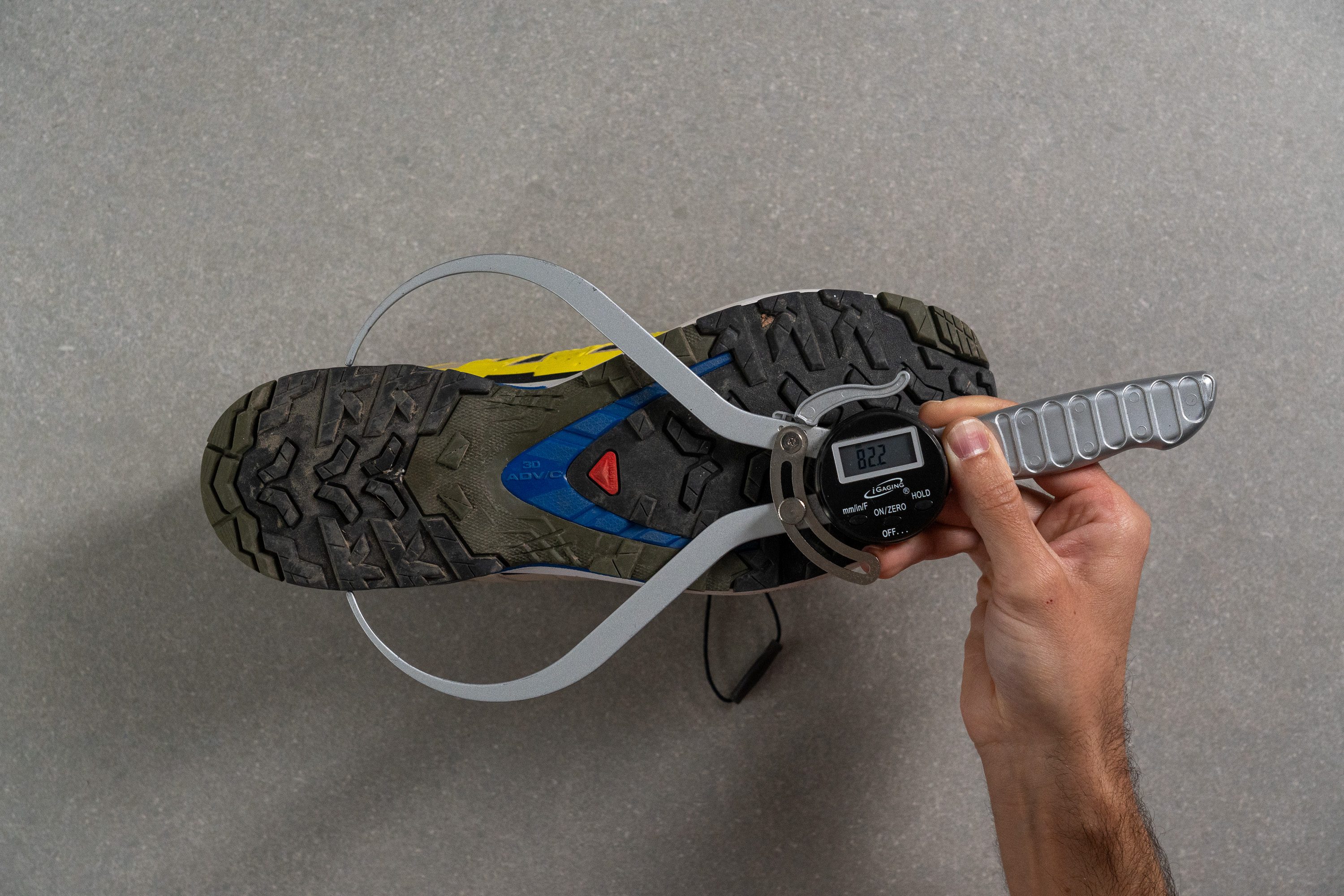
For heel strikers more accustomed to a wider landing platform, we recommend the Hoka Challenger 7 with its robust heel as a more suitable alternative.
| XA Pro 3D v9 GTX | 82.2 mm |
| Average | 89.9 mm |
Durability
Toebox durability
In the first of our series of durability tests, we fired up our Dremel to 5K RPM and set it against the XA Pro 3D v9 GTX's toebox with 3.2N of force.
After four seconds of grinding, we found that the tool only managed to smooth out the criss-cross pattern on the rubber; leaving a mere scuff in its wake and leaving the toebox material below completely unscathed. This earns the XA Pro 3D v9 GTX a perfect 5 out of 5 for toebox durability and means that we need not fear stubbed toes or significant damage to the toebox while braving the elements in this shoe.
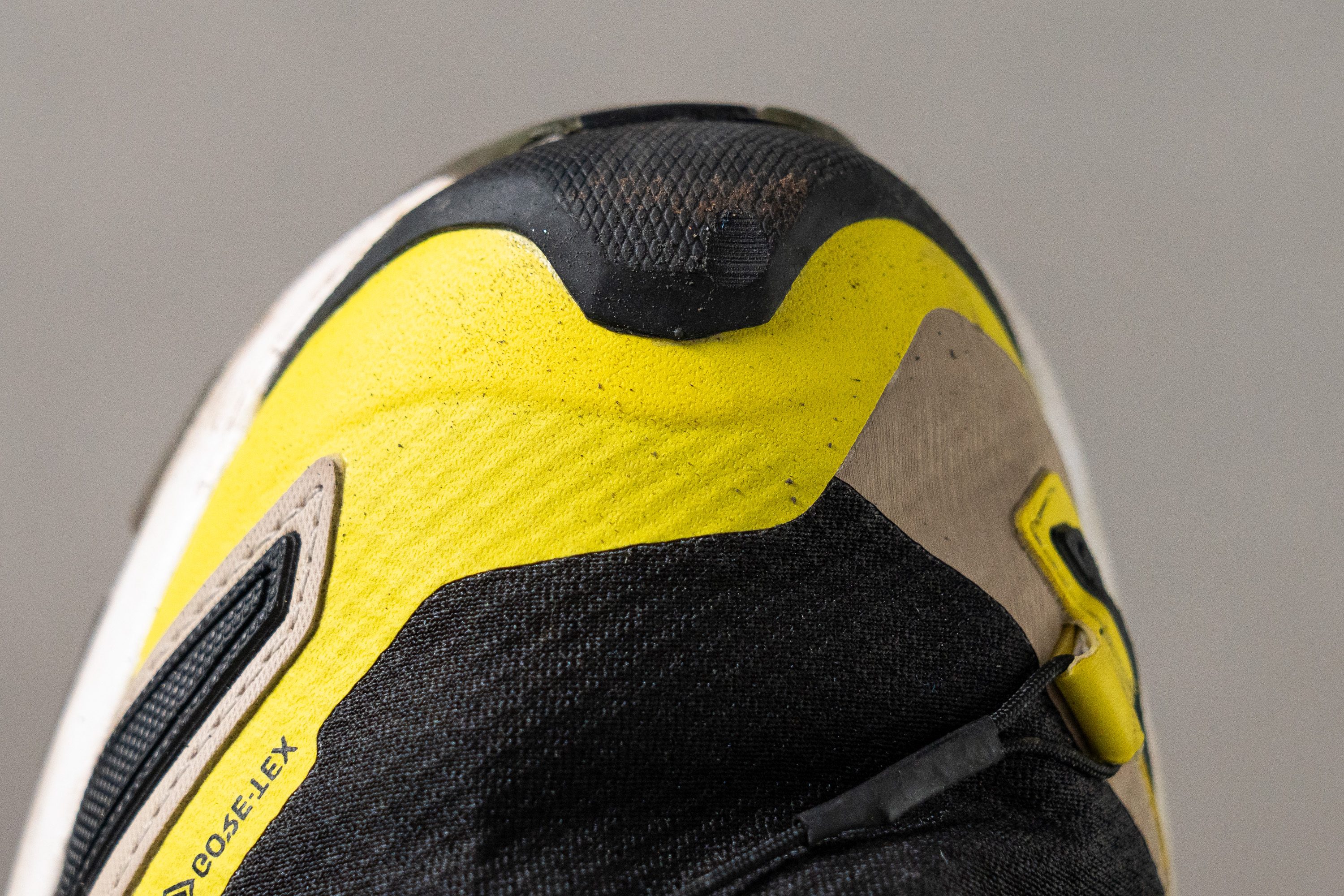
| XA Pro 3D v9 GTX | 5 |
| Average | 3.1 |
Heel padding durability
The heel collar proved to be a lot less tank-like in its constitution as our Dremel was able to make quick work of the lining and roughed up the soft padding within.
This earns the XA Pro 3D v9 GTX a heel padding durability score of 2 out of 5 as there was still some material left behind within the crater left behind in the aftermath of the four-second test.
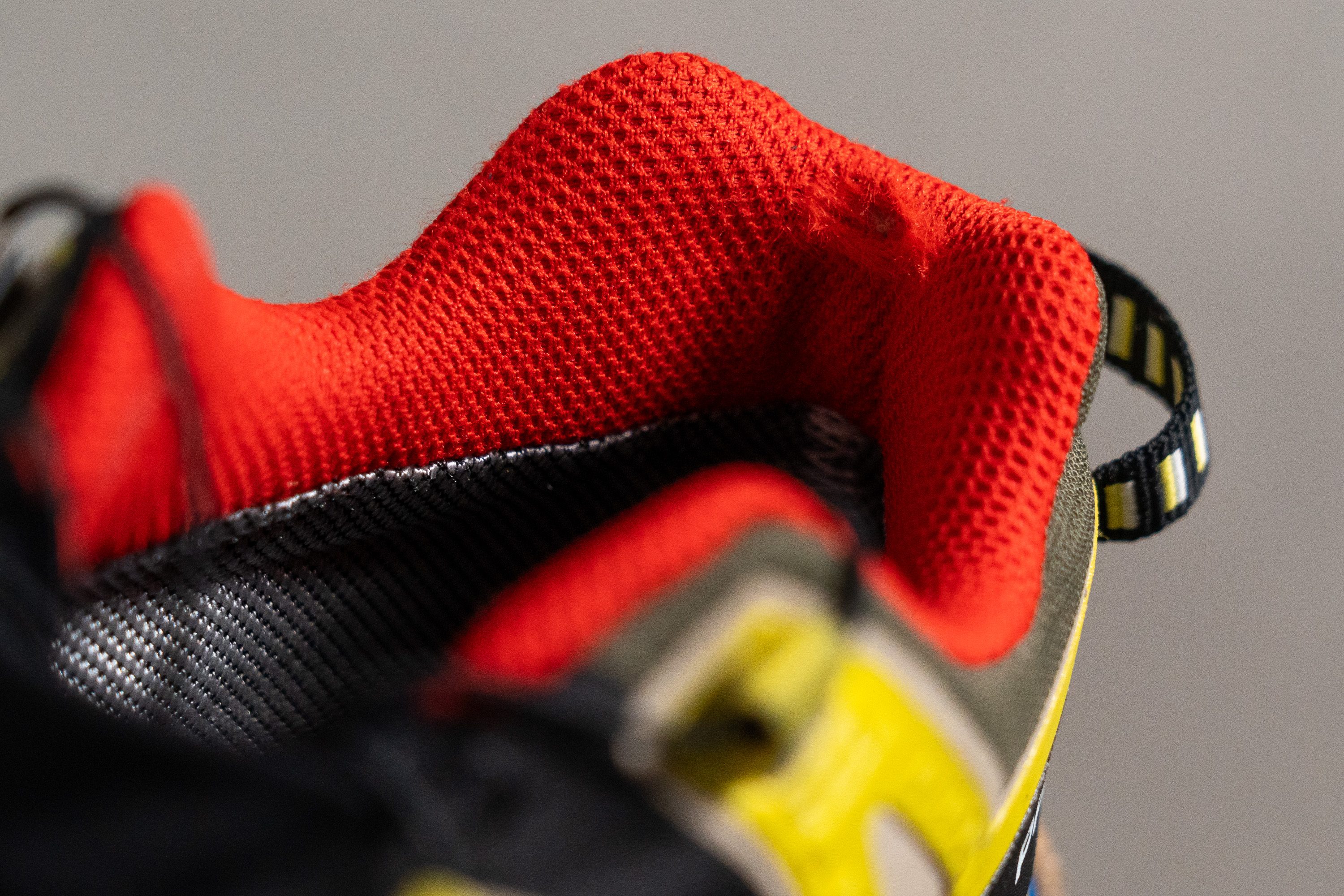
| XA Pro 3D v9 GTX | 2 |
| Average | 3 |
Outsole hardness
The XA Pro 3D v9 GTX's Contragrip outsole gives us a durometer reading of 83.5 HC. This is about as hard as our current lab average and usually denotes a good mix of grip and durability, the latter of which will be put to the test in the next section.
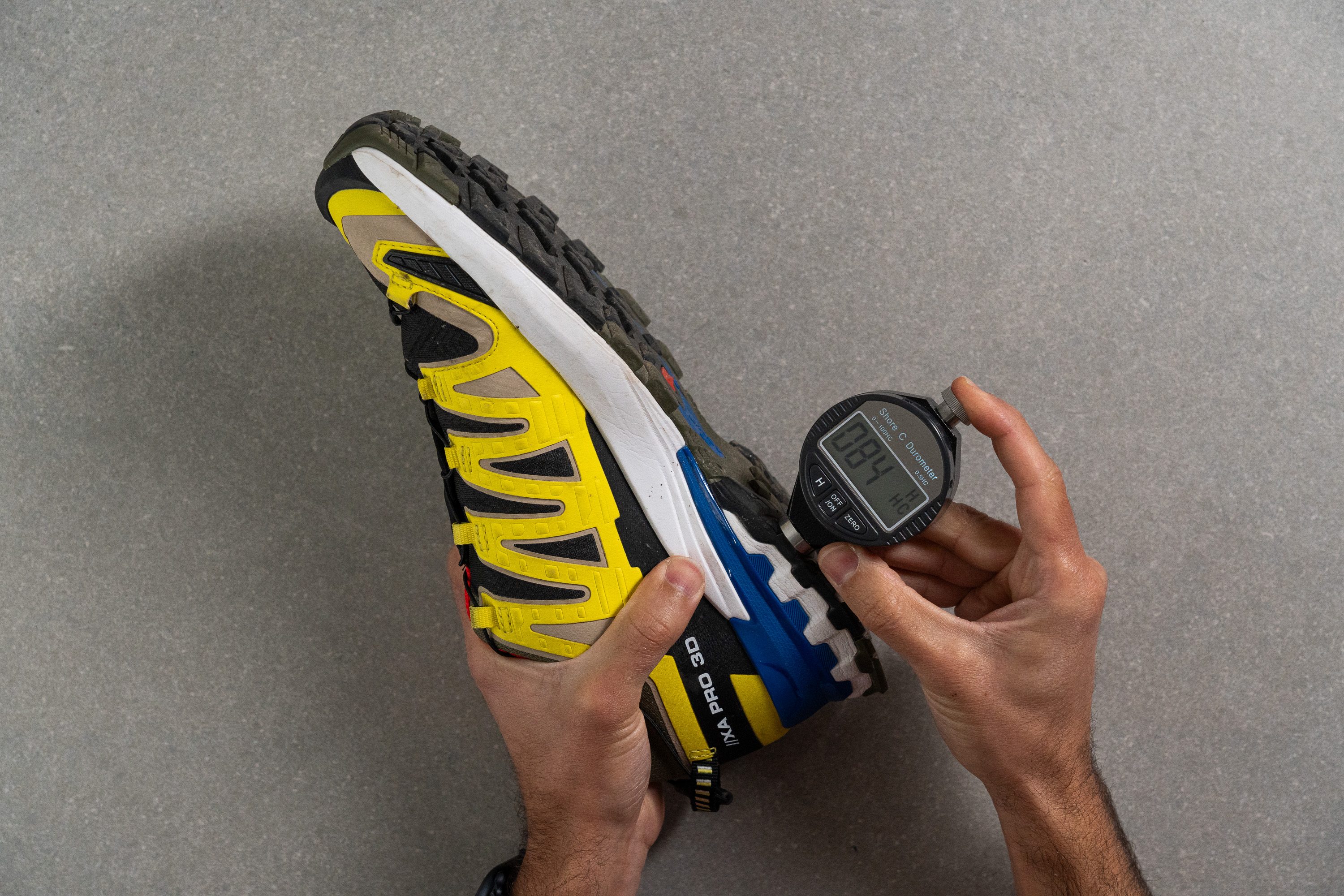
| XA Pro 3D v9 GTX | 83.6 HC |
| Average | 85.8 HC |
Outsole durability
For the final appearance of our Dremel, we fired it up to 10K RPM and set it against one of the XA Pro 3D v9 GTX's outsole lugs.
Using a tyre tread gauge to measure the damage after twenty-two seconds of grinding, we found that we had lopped off 0.8 mm of rubber from the outsole. This falls in line with our current lab average and leads us to predict that the shoe should comfortably last 400 miles before developing any significant signs of wear and tear to the outsole.

| XA Pro 3D v9 GTX | 0.8 mm |
| Average | 0.9 mm |
Outsole thickness
The XA Pro 3D v9 GTX's outsole is about as thick as the average trail shoe's at 3 mm thick. This gives us a healthy amount of rubber above the lugs to keep our feet protected from underfoot hazards as well as adding to the longevity of the shoe.
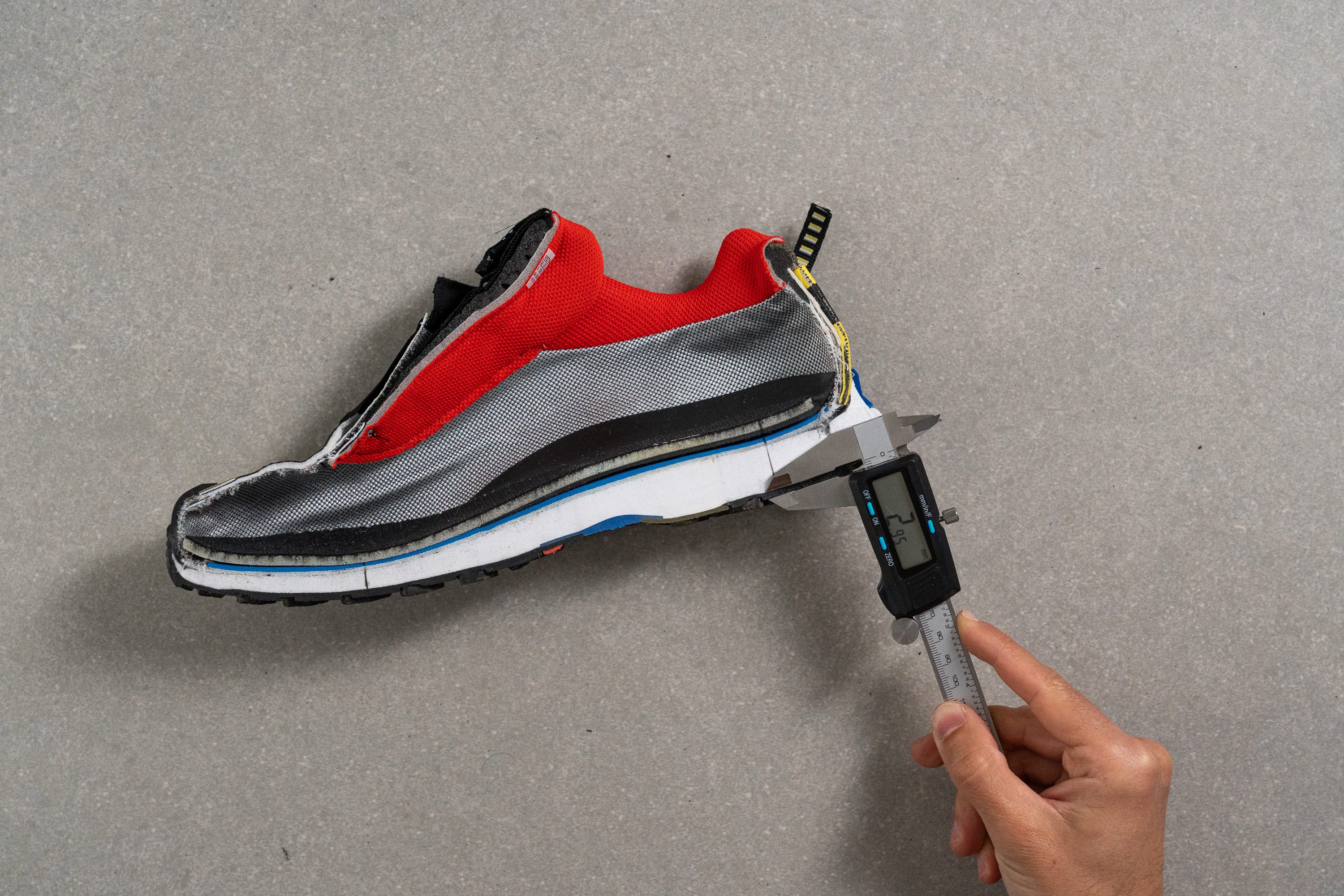
| XA Pro 3D v9 GTX | 3.0 mm |
| Average | 2.2 mm |
Misc
Insole thickness
At 5.5 mm thick according to our calliper measurements, the XA Pro 3D v9 GTX's insole is slightly thicker than our current lab average.
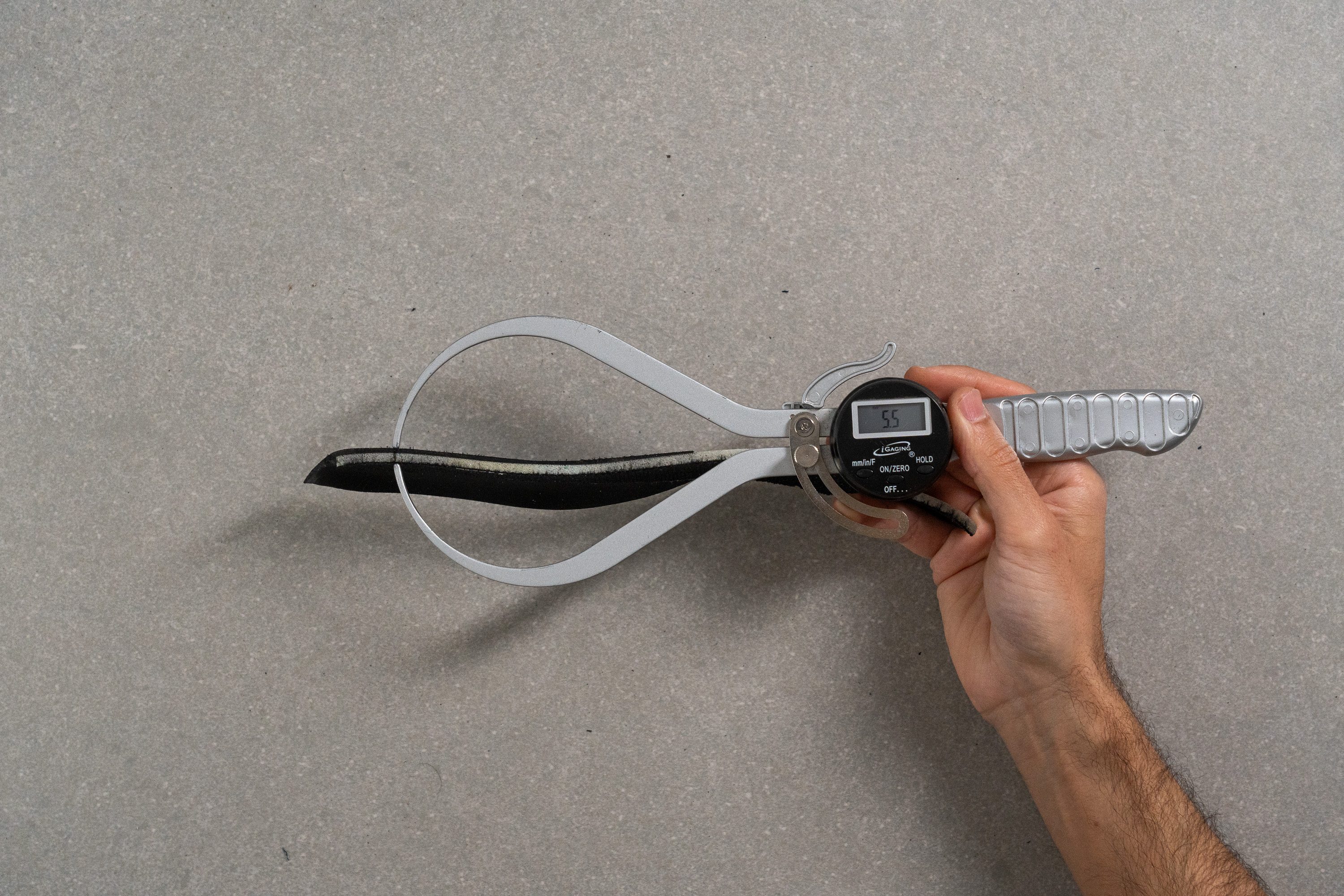
This not only provides us with good arch support during our test runs but gives us a nice and cushy footbed to sink into within the shoe that complements the midsole cushioning.
| XA Pro 3D v9 GTX | 5.5 mm |
| Average | 4.7 mm |
Removable insole
The XA Pro 3D v9 GTX's insole is fully removable so replacing it with an aftermarket one or a custom orthotic is possible if necessary.
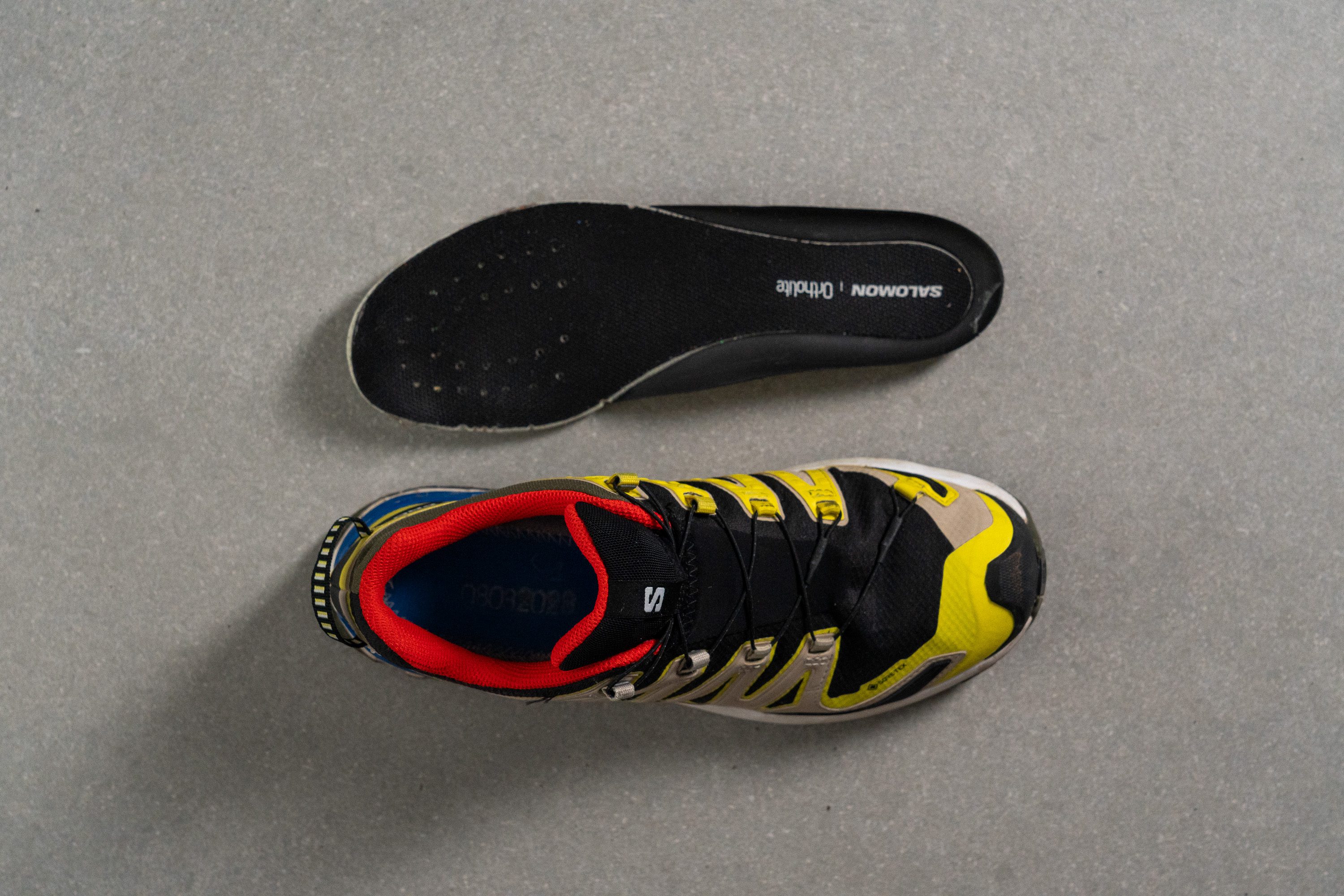
| XA Pro 3D v9 GTX | Yes |
Midsole softness in cold (%)
to measure the effect of cold conditions on the midsole foam, we placed the XA Pro 3D v9 GTX in the freezer. Once sufficiently chilled after twenty minutes, we pressed our durometer against the foam once more and found that it only became 12.8% firmer. This is a much more consistent performance than average and means that, albeit firm, the shoe's cushioning will feel the same all year round.
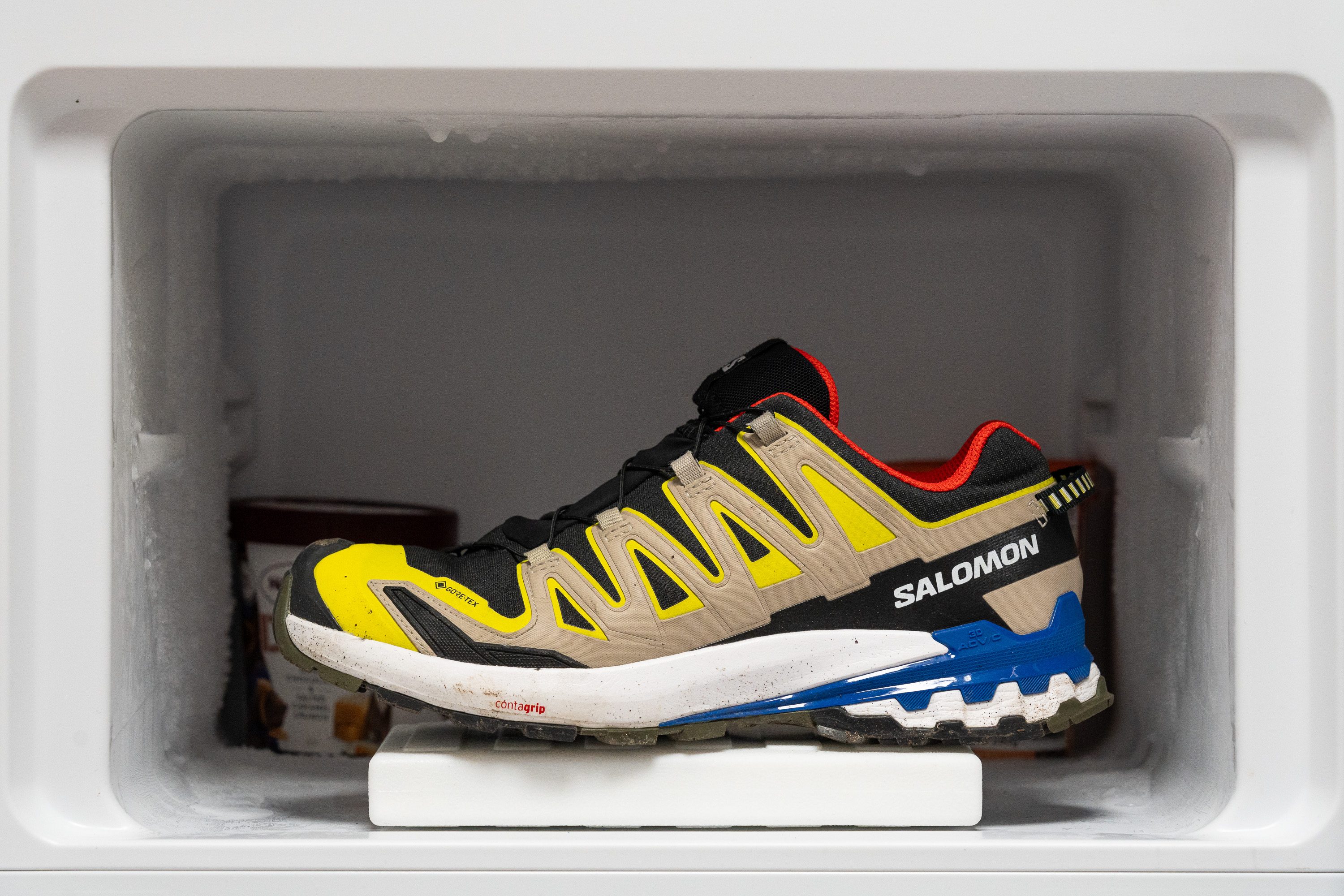
| XA Pro 3D v9 GTX | 13% |
| Average | 26% |
Reflective elements
The XA Pro 3D v9 GTX doesn't feature any reflective elements throughout the shoe, so we don't recommend running or hiking along dimly lit roads at night without using additional high-vis gear.
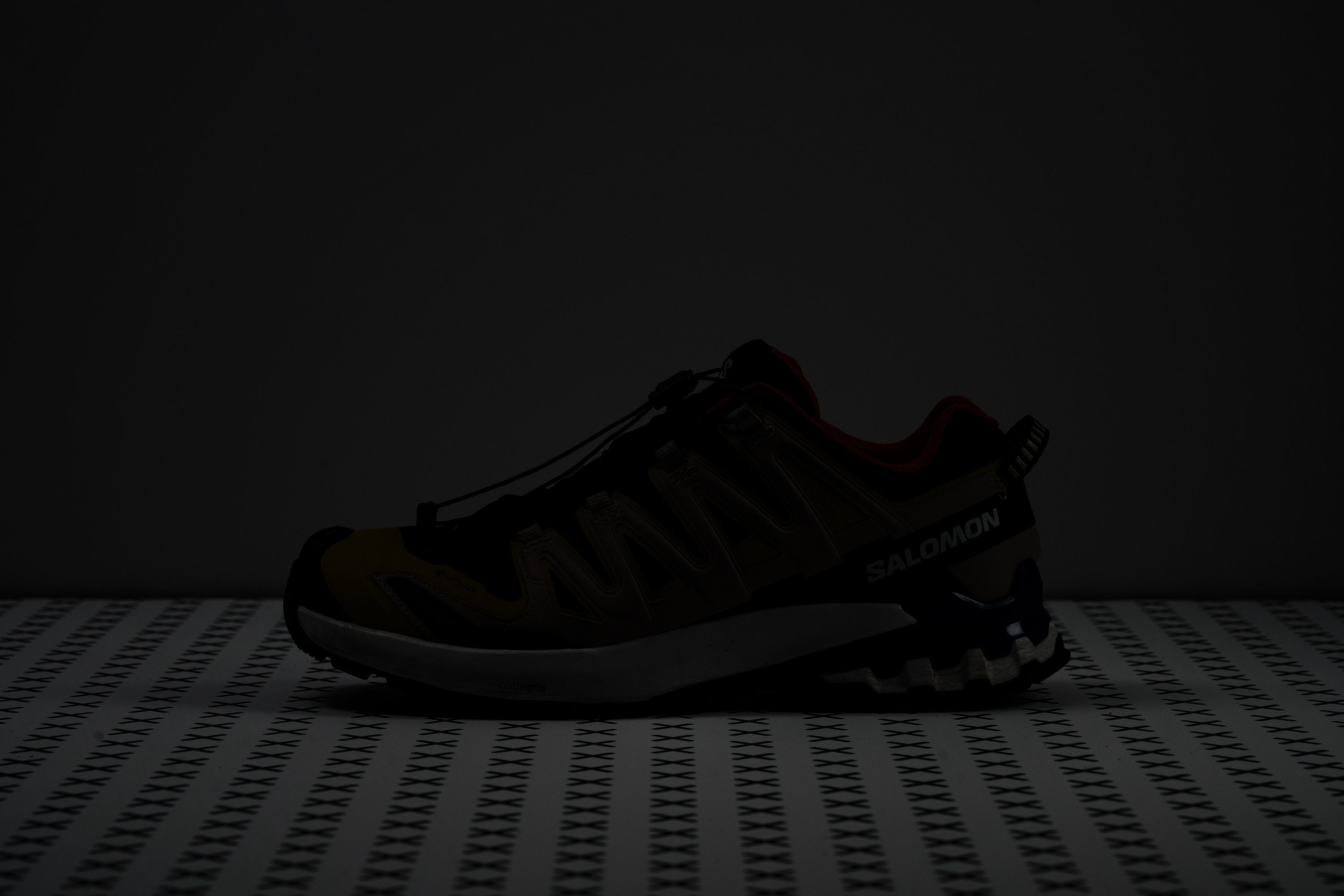
| XA Pro 3D v9 GTX | No |
Tongue padding
The XA Pro 3D v9 GTX's tongue is incredibly chunky at 10.3 mm thick according to our calliper measurements. This is much thicker than average which, along with the nifty lacing system, means that lace bite was the least of our concerns while testing this shoe. This also helps us achieve a secure and extremely comfy midfoot lockdown.
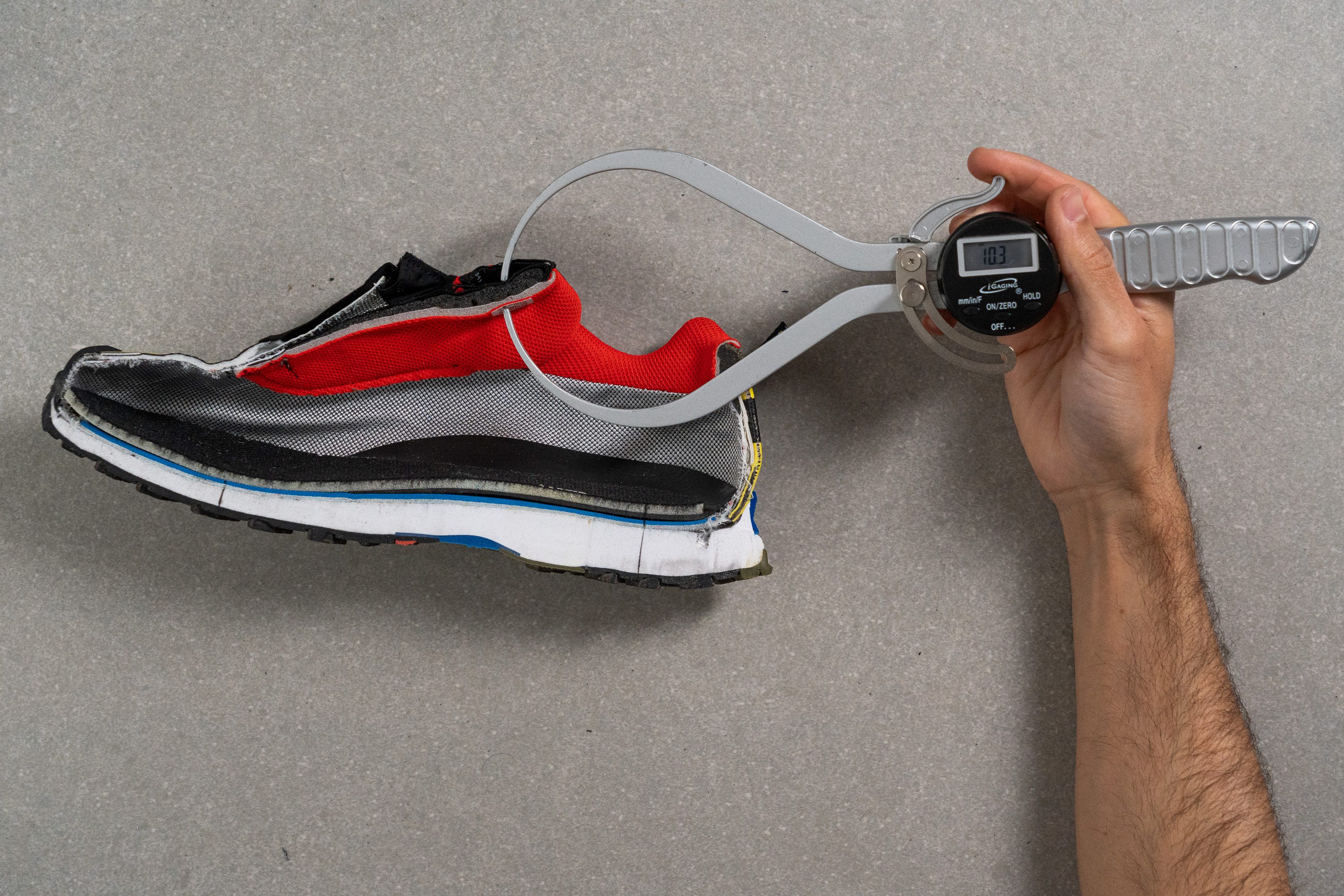
| XA Pro 3D v9 GTX | 10.3 mm |
| Average | 6.4 mm |
Tongue: gusset type
The XA Pro 3D v9 GTX doesn't feature a typical gusset that attaches the tongue to the shoe but instead has a layer of mesh between the laces and tongue.
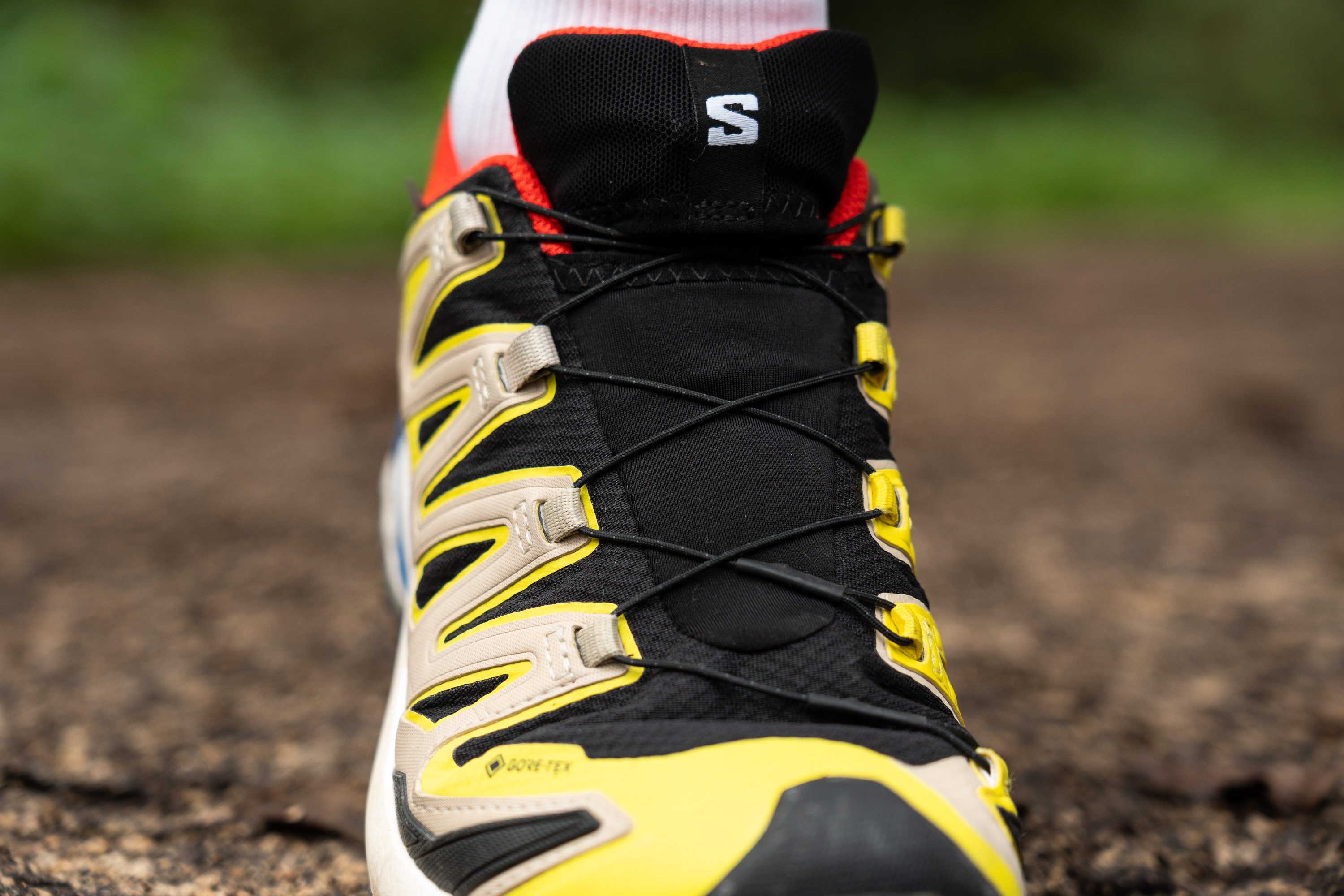
This acts as an external gusset that keeps bits of grit and debris we kick up from entering the shoe as we run.
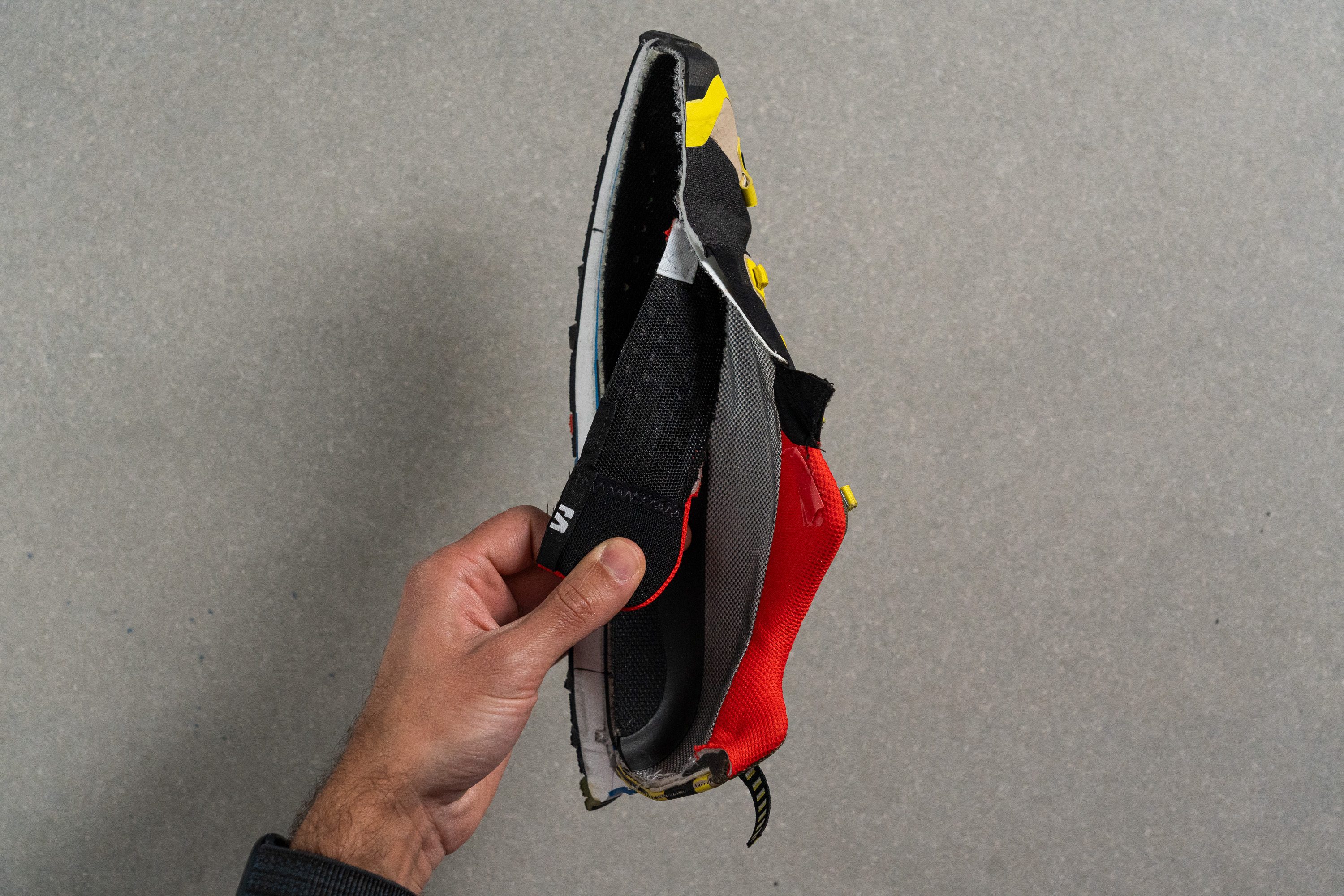
| XA Pro 3D v9 GTX | None |
Heel tab
The're a snazzy strap at the heel of the XA Pro 3D v9 GTX that not only looks cool but also makes it a little easier for us to slide the shoe on.
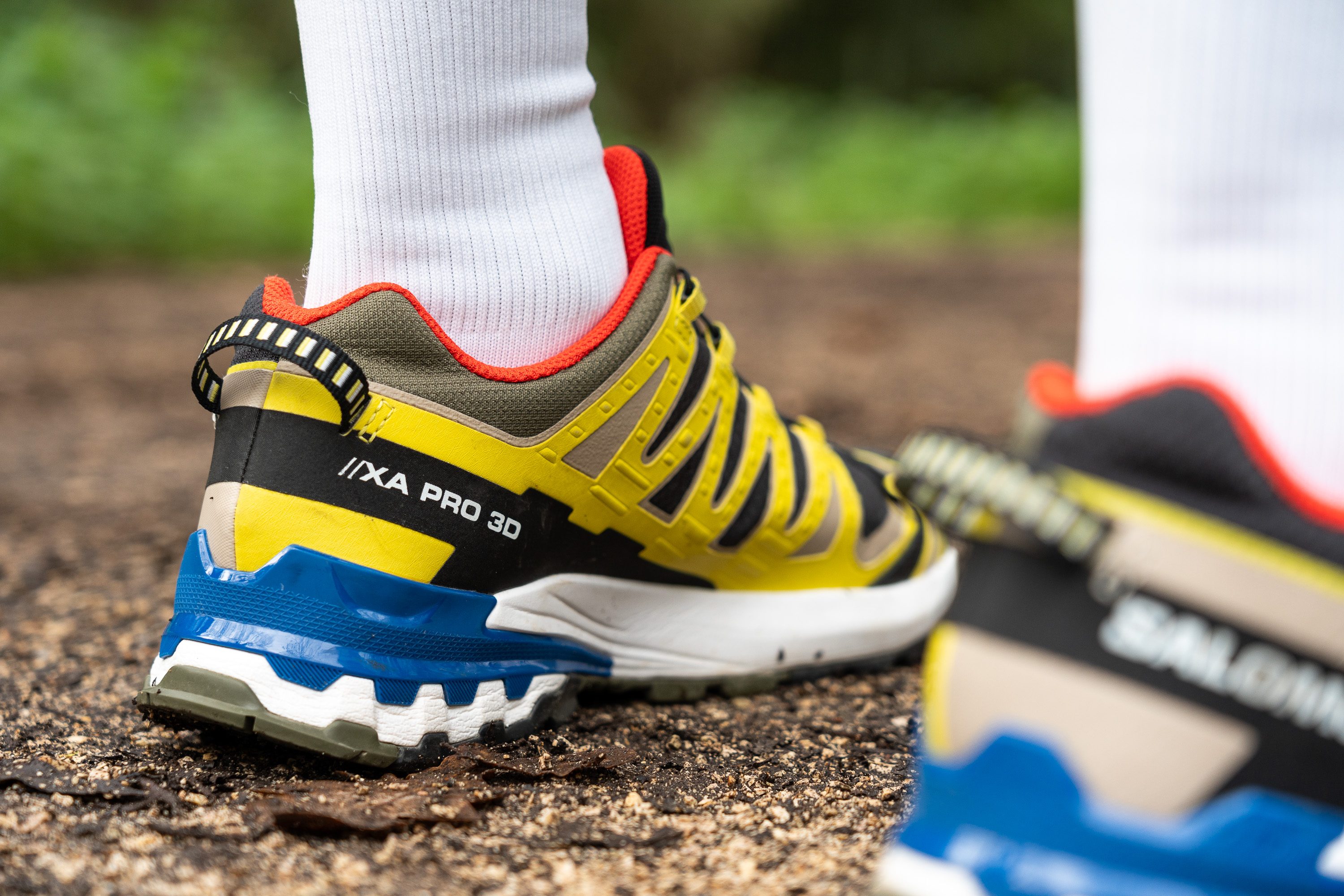
| XA Pro 3D v9 GTX | Finger loop |

